Results 31 to 40 of 42
Thread Information
Users Browsing this Thread
There are currently 1 users browsing this thread. (0 members and 1 guests)
-
01-04-2019, 06:42 AM #31If you're gonna fight, fight like you're the third monkey on the ramp to Noah's Ark... and brother its starting to rain. Join our efforts to Secure America's Borders and End Illegal Immigration by Joining ALIPAC's E-Mail Alerts network (CLICK HERE)
-
01-04-2019, 06:53 AM #32
But Trump will. Trump isn't going to win the government shutdown, for the simple reason that he doesn't have the votes in the Senate, but he'll win the war on war, the war on poverty, the war on bad trade deals, and the war on illegal and excess legal immigration. He'll win a bunch of others as well, but most people don't care so much about those, but they matter too and our country and citizens will be far better off when he does.
A Nation Without Borders Is Not A Nation - Ronald Reagan
Save America, Deport Congress! - Judy
Support our FIGHT AGAINST illegal immigration & Amnesty by joining our E-mail Alerts at https://eepurl.com/cktGTn
-
01-19-2019, 08:44 PM #33
The 75th Ranger Regiment
Yesterday at 08:03 ·
U.S. Army Ranger Dies of Wounds
FORT BRAGG, N.C. – An Army Ranger died on January 17th, from wounds received during combat operations January 12 in Badghis Province, Afghanistan while serving with Company A, 2nd Battalion, 75th Ranger Regiment based at Joint Base Lewis-McChord, Washington.
Sgt. Cameron A. Meddock, 26, of Spearman, Texas, died Jan. 17, 2019, in Landstuhl, Germany, as a result of wounds sustained from small arms fire on Jan. 12, 2019, in Badghis Province, Afghanistan.
“Sergeant Cameron Meddock is one of America’s precious Sons. The entire Nation should strive to emulate the Warrior, Patriot and Husband that Cameron was. The 75th Ranger Regiment will forever honor Sergeant Cameron Meddock and his family will forever be a member of our Ranger family,” said Colonel Brandon Tegtmeier, Commander of the 75th Ranger Regiment.
Meddock enlisted in the U.S. Army November 14, 2014.
He completed One Station Unit Training as an Infantryman, the Basic Airborne Course and the Ranger Assessment and Selection Program 1 at Fort Benning, Georgia.
Lieutenant Colonel Rob McChrystal, Commander of 2nd Ranger Battalion further stated that “Sergeant Cameron Meddock was a phenomenal Ranger, and his selfless service represents the very best of our great Nation. He will be missed dearly and the 2nd Ranger Battalion offers its sincerest condolences to his family.”
Following successful completion of Ranger Assessment and Selection Program Level 1, Meddock was assigned to Company A, 2nd Battalion, 75th Ranger Regiment where he served as a machine gunner, automatic rifleman, gun team leader and most recently as a fire team leader.
His military education includes the U.S. Army Ranger Course, Basic Airborne Course, Basic Leader Course, and Survival, Evasion, Resistance and Escape Course.
Meddock’s awards include a Purple Heart, a Joint-Service Commendation for Combat, the Army Achievement Medal with two Oak Leaf Clusters, Army Good Conduct Medal, National Defense Service Medal, Afghanistan Campaign Medal with Campaign Star, Global War on Terrorism Service Medal, Army Service Ribbon, Overseas Service Ribbon, and the NATO Medal. He was on his second deployment in support of Operation Resolute Support.
Meddock’s decorations include the Ranger Tab, Parachutists Badge, Expert Infantryman’s Badge, Combat Infantryman’s Badge, and the Expert Marksmanship Qualification Badge for a Rifle.
 If you're gonna fight, fight like you're the third monkey on the ramp to Noah's Ark... and brother its starting to rain. Join our efforts to Secure America's Borders and End Illegal Immigration by Joining ALIPAC's E-Mail Alerts network (CLICK HERE)
If you're gonna fight, fight like you're the third monkey on the ramp to Noah's Ark... and brother its starting to rain. Join our efforts to Secure America's Borders and End Illegal Immigration by Joining ALIPAC's E-Mail Alerts network (CLICK HERE)
-
01-19-2019, 09:36 PM #34
Such a handsome young man serving our country. Broken hearted loved ones. Makes no sense. Bring them home. Eighteen years is enough.
Matthew 19:26
But Jesus beheld them, and said unto them, With men this is impossible; but with God all things are possible.
____________________
Join our efforts to Secure America's Borders and End Illegal Immigration by Joining ALIPAC's E-Mail Alerts network (CLICK HERE)
-
01-19-2019, 10:57 PM #35
Bring them all home now.
A Nation Without Borders Is Not A Nation - Ronald Reagan
Save America, Deport Congress! - Judy
Support our FIGHT AGAINST illegal immigration & Amnesty by joining our E-mail Alerts at https://eepurl.com/cktGTn
-
01-20-2019, 05:11 AM #36
The Deep State is going to be P.O.ed; Nancy must be going to check out the damage

neonnettle.com
Trump's Airstrikes Destroy Acres of Poppy Fields, Ends Afghanistan's Opium Trade
If you're gonna fight, fight like you're the third monkey on the ramp to Noah's Ark... and brother its starting to rain. Join our efforts to Secure America's Borders and End Illegal Immigration by Joining ALIPAC's E-Mail Alerts network (CLICK HERE)
-
01-22-2019, 07:31 AM #37

foxnews.com
Married Army Ranger, 26, dies in Afghanistan, becoming first military fatality of 2019
Married Army Ranger, 26, dies in Afghanistan, becoming first military fatality of 2019
By Barnini Chakraborty | Fox News

According to Meddock’s hometown newspaper, the High Plains Observer, he leaves behind a wife, Stephanie, who is expecting the couple's first child. (Instagram)
An Army Ranger from the elite 75th Ranger Regiment, part of Joint Special Operations Command (JSOC), died Thursday in a military hospital from wounds received during a raid in Afghanistan, the Pentagon confirmed Friday.
Sgt. Cameron Meddock, 26, died in Landstuhl, Germany of injuries sustained from small-arms fire Jan. 13 in Badghis Province, Afghanistan. It was his second deployment.
MEMORIAL HONORING FALLEN NAVY SEAL, MEDAL OF HONOR RECIPIENT IS RESTORED FOLLOWING VANDALISM

Meddock's death marks the first U.S. military fatality in Afghanistan in 2019. There are about 14,000 U.S. military forces in Afghanistan. (Handout)
WESTERN TOURISTS HEAD TO WAR-TORN AFGHANISTAN FOR 'AUTHENTIC' TRAVEL EXPERIENCE
“Sergeant Cameron Meddock is one of America’s precious sons. The entire nation should strive to emulate the warrior, patriot and husband that Cameron was," Col. Brandon Tegtmeier, commander of the 75th Ranger Regiment, said in a statement. “The 75th Ranger Regiment will forever honor Sergeant Cameron Meddock, and his family will forever be a member of our Ranger family.”
Meddock's death marks the first U.S. military fatality in Afghanistan in 2019. There are about 14,000 U.S. military forces in Afghanistan. Troops are there mostly to aid the Afghan military in its fight against the Taliban and an ISIS-affiliated groups.
According to Meddock’s hometown newspaper, the High Plains Observer, he leaves behind a wife, Stevie, who is expecting the couple's first child.
Meddock received numerous awards and decorations including the Purple Heart, the Joint Service Commendation for Combat, the Army Achievement Medal with two Oak Leaf Clusters, the Afghanistan Campaign Medal with campaign star, the Ranger Tab, the Parachutist Badge, the Expert Infantryman Badge and the Combat Infantryman Badge, the Army Times reported.
According to Khaama Press, the largest news agency in Afghanistan, the area Meddock was wounded has been largely stable. In recent years however, an ISIS offshoot, the Islamic State-Khurasan, has developed a foothold in some of the province’s remote districts. At least 10 ISIS-K militants were killed during an operation in Badghis, the Khaama Press reported.
You can find Barnini Chakraborty on Twitter @Barnini.
https://www.foxnews.com/world/marrie...tality-of-2019If you're gonna fight, fight like you're the third monkey on the ramp to Noah's Ark... and brother its starting to rain. Join our efforts to Secure America's Borders and End Illegal Immigration by Joining ALIPAC's E-Mail Alerts network (CLICK HERE)
-
04-03-2022, 07:46 PM #38
the deep state poppy fields are being shut down
Ep. 2741b - Drops Will Go Fast, Everything Is Planned, Old Guard In The Process Of Being Removed (bitchute.com)
U.S. Occupation Leads to All-Time High Afghan Opium Production
BY ADMIN · MARCH 26, 2014
Washington’s Blog
Drug War? American Troops Are Protecting Afghan Opium
It is well-documented that the U.S. government has – at least at some times in some parts of the world –protected drug operations.
(Big American banks also launder money for drug cartels. See this, this, this and this. Indeed, drug dealers kept the banking system afloat during the depths of the 2008 financial crisis. And the U.S. drug money laundering is continuing to this day.)
The U.S. military has openly said that it is protecting Afghani poppy fields.
As Wikipedia notes:
Opium production in Afghanistan has been on the rise since U.S. occupation started in 2001.
Indeed, a brand new report from the United Nations finds that opium production is at an all-time high.
Common Dreams notes:
The cultivation of opium poppy in Afghanistan—a nation under the military control of US and NATO forces for more than twelve years—has risen to an all-time high, according to the 2013 Afghanistan Opium Survey released Wednesday by the United Nations.
According to the report, cultivation of poppy across the war-torn nation rose 36 per cent in 2013 and total opium production amounted to 5,500 tons, up by almost a half since 2012.
“This has never been witnessed before in the history of Afghanistan,” said Jean-Luc Lemahieu, the outgoing leader of the Afghanistan office of the United Nations Office on Drugs and Crime, which produced the report.
***
The U.S. military has allowed poppy cultivation to continue in order to appease farmers and government officials involved with the drug trade who might otherwise turn against the Afghan Karzai government in Kabul. Fueling both sides, in fact, the opium and heroin industry is both a product of the war and an essential source for continued conflict.
Public Intelligence has published a series of photographs showing American – and U.S.-trained Afghan – troops patrolling poppy fields in Afghanistan. Public Intelligence informs us that all of the photos are in the public domain, and not subject to copyright, and they assured me that I have every right to reproduce them.
We produce these photos and the accompanying descriptions from Public Intelligence without further comment.
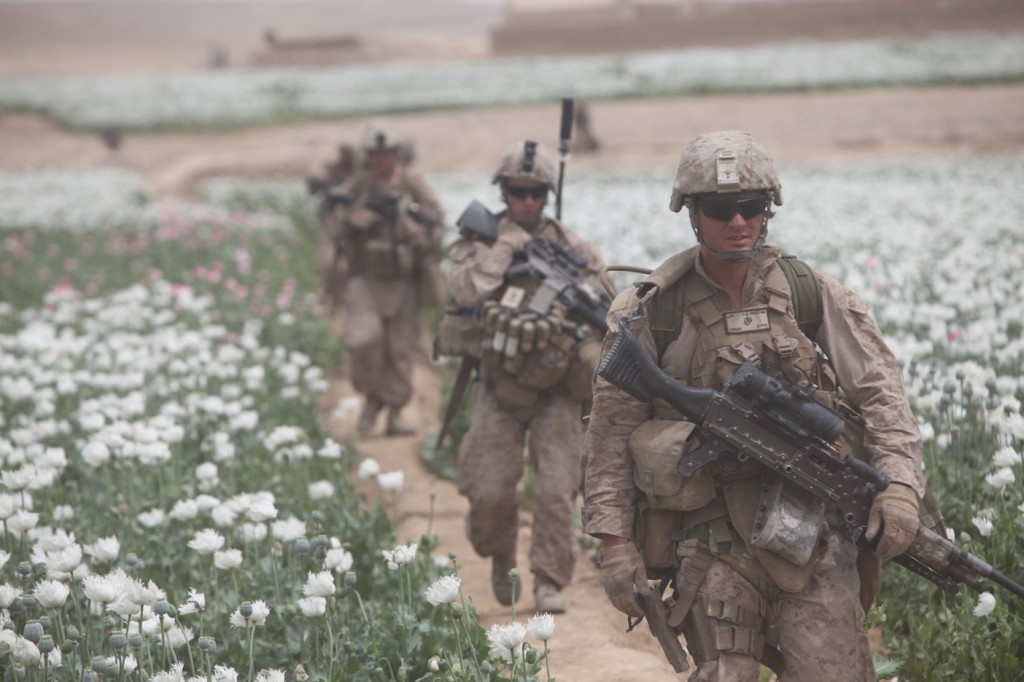
U.S. Marines with Fox Company, 2nd Battalion, 5th Marine Regiment, Regimental Combat Team 6, patrol through a poppy field during Operation Lariat in the Lui Tal district, Helmand province, Afghanistan, April 16, 2012. The Marines conducted the operation to disrupt enemy logistics and establish a presence in the area. (U.S. Marine Corps photo by Lance Cpl. Ismael E. Ortega/Released)
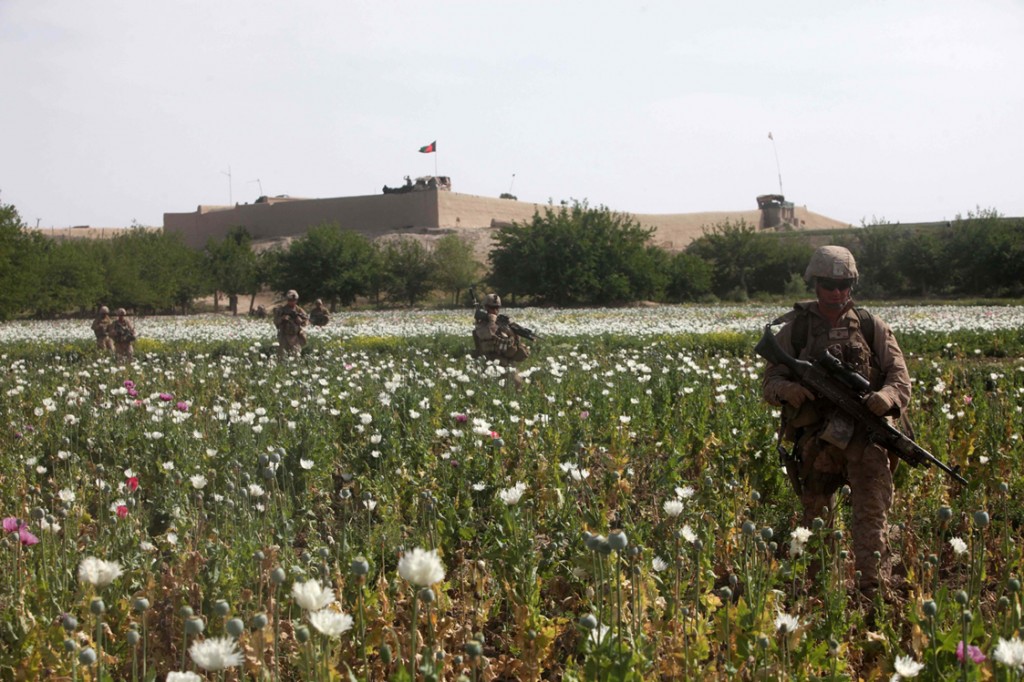
U.S. Marines with Fox Company, 2nd Battalion, 5th Marine Regiment, Regimental Combat Team 6, patrol through a poppy field on their way to Patrol Base (PB) Mohmon in the Lui Tal district, Helmand province, Afghanistan, April 17, 2012. The Marines joined with coalition forces at the PB to begin conducting operations in the area. (U.S. Marine Corps photo by Lance Cpl. Ismael E. Ortega/Released)
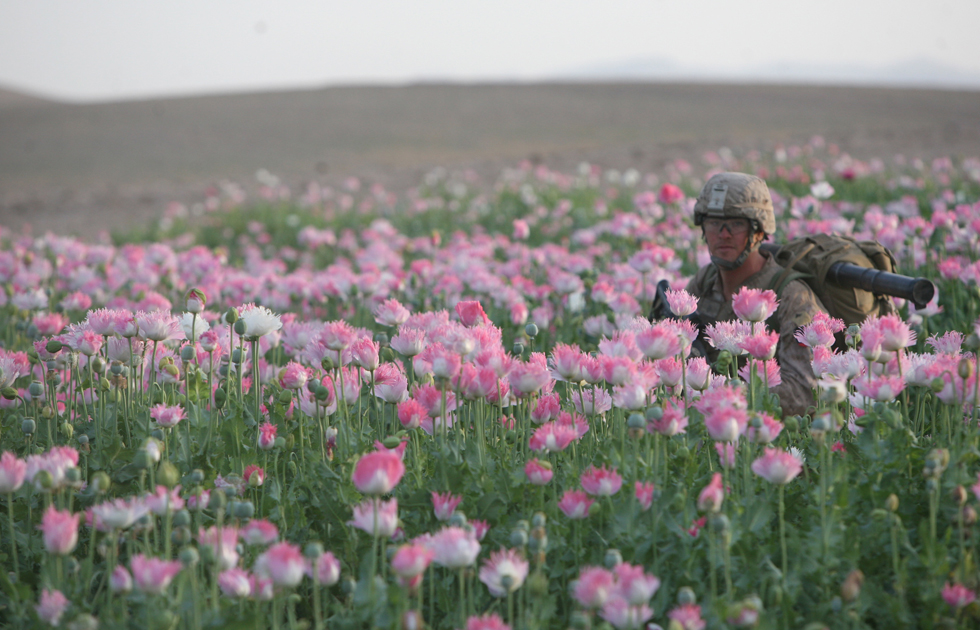
U.S. Marine Corps Lance Cpl. John K. Silvernail with Golf Company, 2D Battalion, 5th Marine Regiment, Regimental Combat Team 6, takes a knee in a field of poppy during a halt in a security patrol in Musa Qal’eh, Helmand province, Afghanistan, April 16, 2012. Marines conducted the patrol to disrupt enemy tactics in the battle space. (U.S. Marine Corps Photo by Lance Cpl. Chistopher M. Paulton/Released)
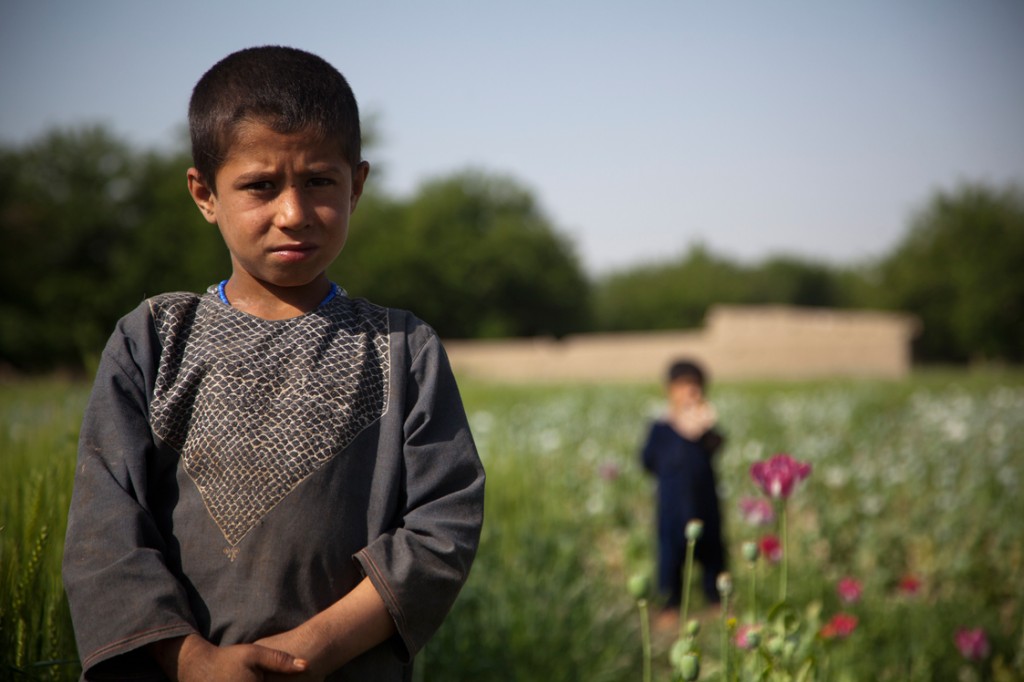
An Afghan boy stands watch over his family’s poppy and wheat fields as U.S. Marines with Bravo Company, 1st Battalion, 7th Marine Regiment, Regimental Combat Team 6 patrol by in Sangin, Helmand province, Afghanistan April 24, 2012. Marines conducted the patrol to interact with the local populace and gather information on enemy activity in the area.
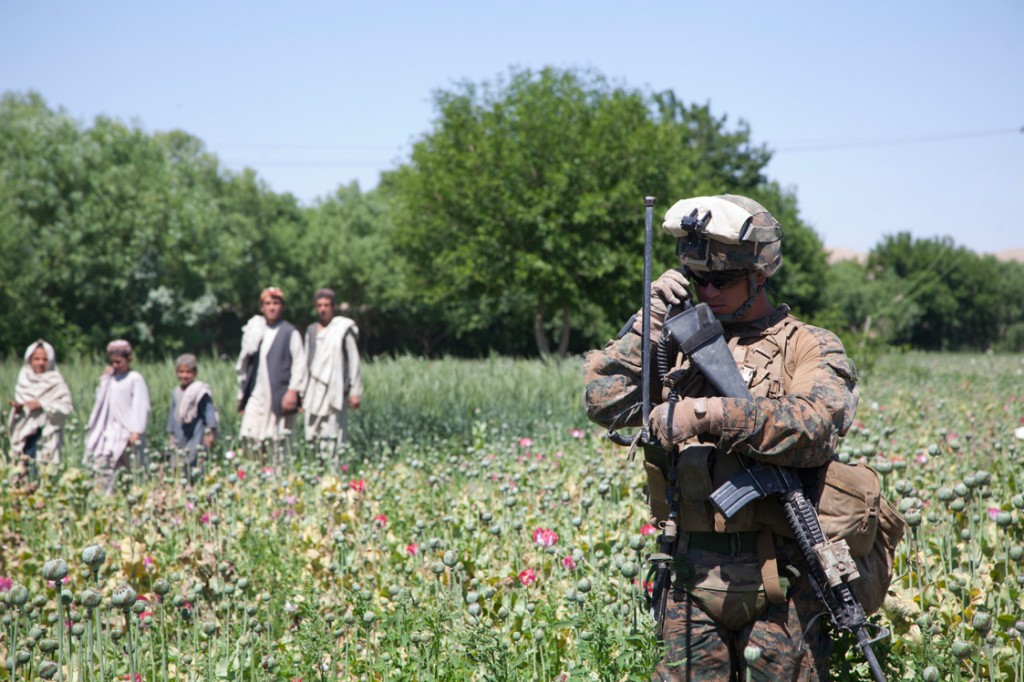
U.S. Marine Corps Sgt. Noel Rodriguez, a team leader with Alpha Company, 1st Battalion, 7th Marine Regiment, Regimental Combat Team 6, communicates with an adjacent squad while on patrol in Sangin, Helmand province, Afghanistan, May 1, 2012. Marines patrolled to provide security in the area and interact with the local populace.
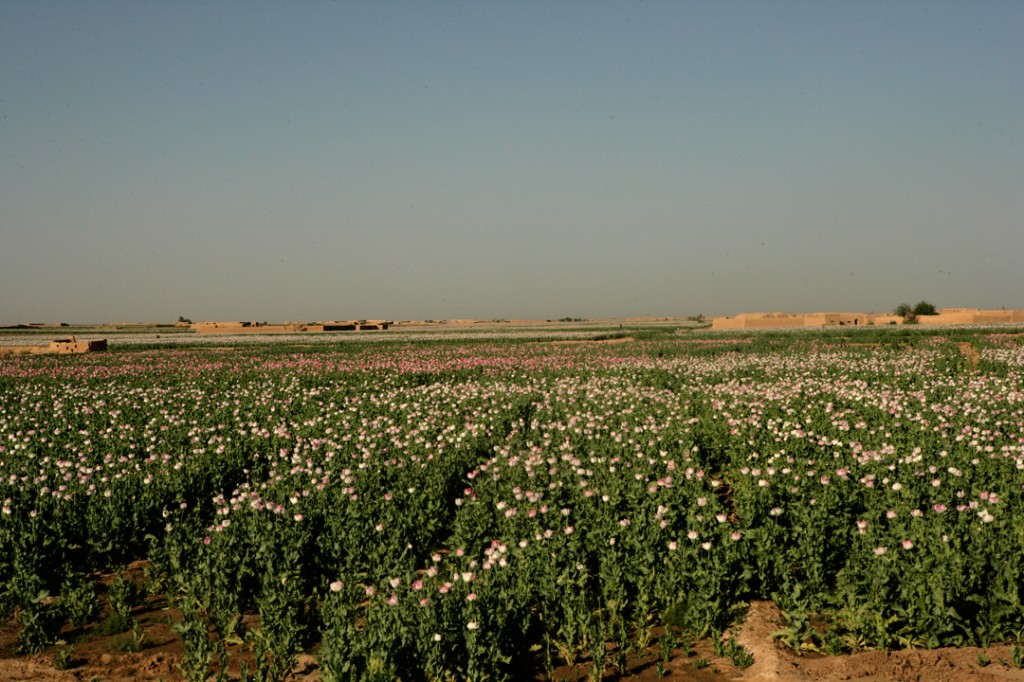
A field filled with opium poppy plants can be seen April 11, 2012, in Marjah, Afghanistan. Heroin is derived from raw opium gum, which comes from opium poppies. (U.S. Marine Corps photo by Sgt Michael P. Snody)
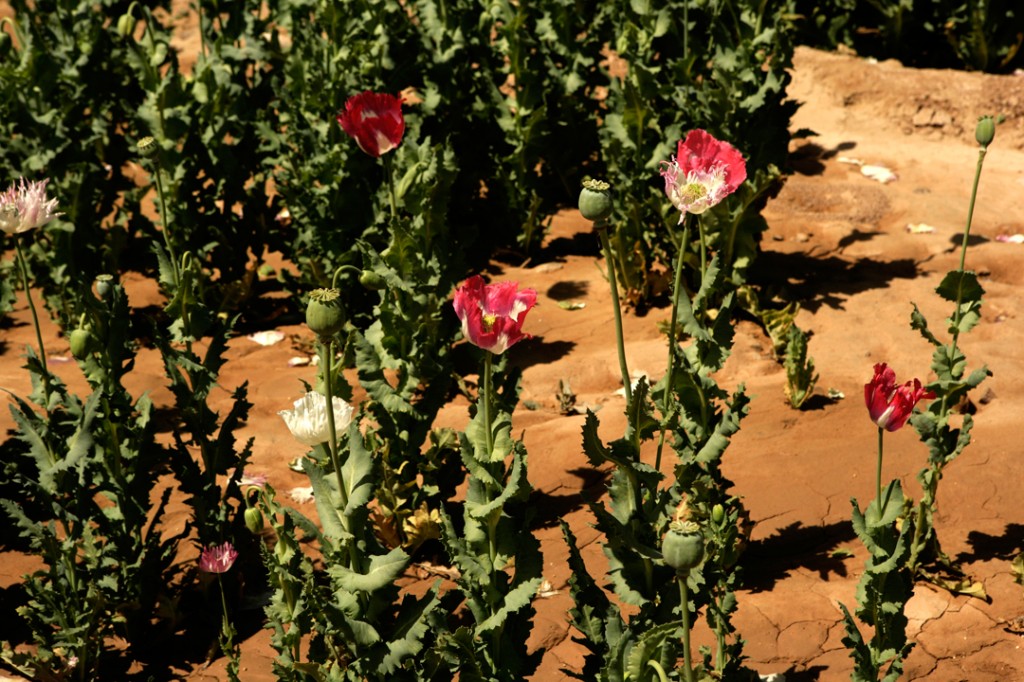
A field filled with opium poppy plants can be seen April 11, 2012, in Marjah, Afghanistan. Heroin is derived from raw opium gum, which comes from opium poppies. (U.S. Marine Corps photo by Sgt Michael P. Snody)
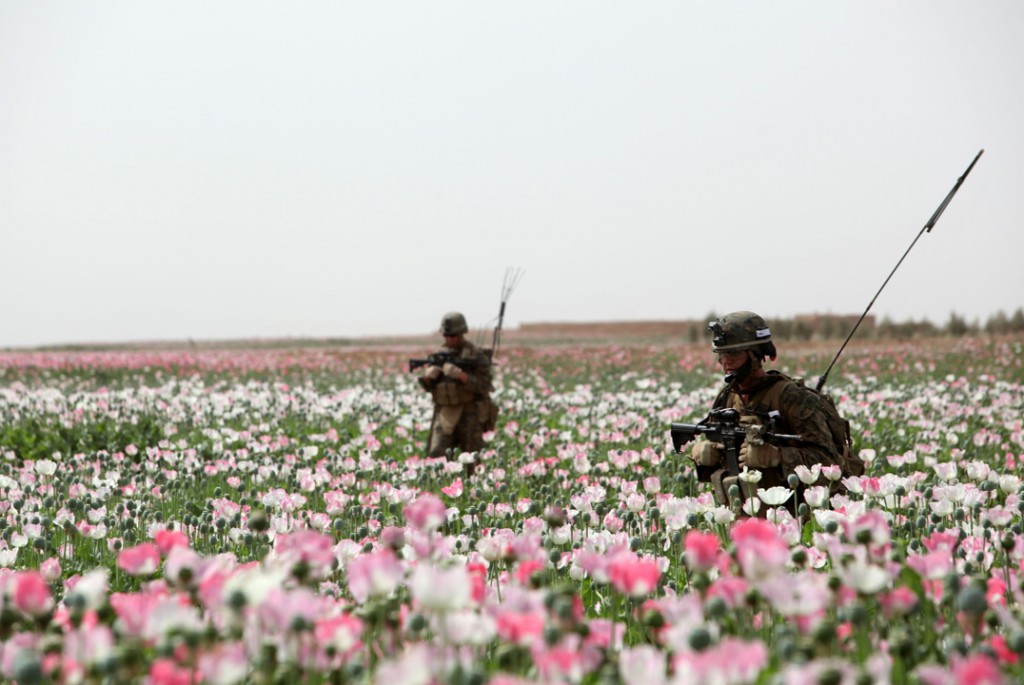
U.S. Marines with Combined Anti-Armor Team (CAAT), Weapons Company, 2D Battalion, 9th Marine Regiment, Regimental Combat Team 5, conduct a satellite patrol through a poppy field in Marjah, Afghanistan, April 16, 2012. CAAT patrolled over a five day period to erect Patrol Base Sledgehammer Four and disrupt insurgent activity in the area. (U.S. Marine Corps photo by Lance Cpl. David A. Perez/Released)
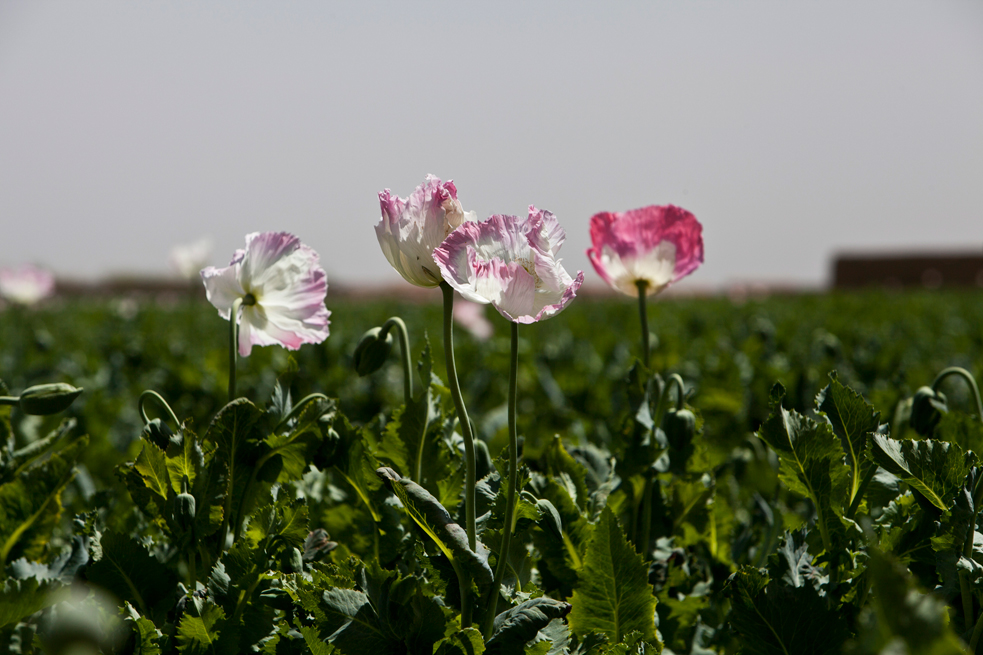
Landscape photo of poppy flowers in Habib Abad, Helmand province, Afghanistan, April 4, 2012. U.S. Marines and Afghanistan National Army soldiers conducted a patrol to disrupt insurgency activity.
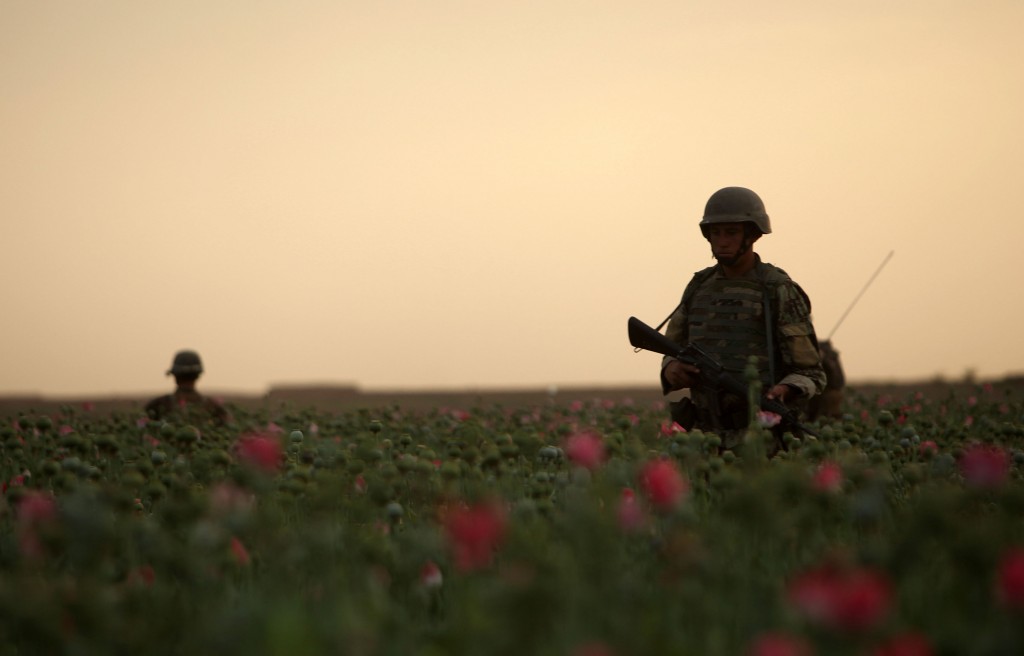
Afghan National Army (ANA) soldier conducts a satellite patrol, April 17, 2012, Marjah, Afghanistan. The ANA took part of a 5 day operation to erect Patrol Base Sledgehammer 4 to disrupt the insurgence activity in the area. (U.S. Marine Corps photo by Lance Cpl. David A. Perez/Released)
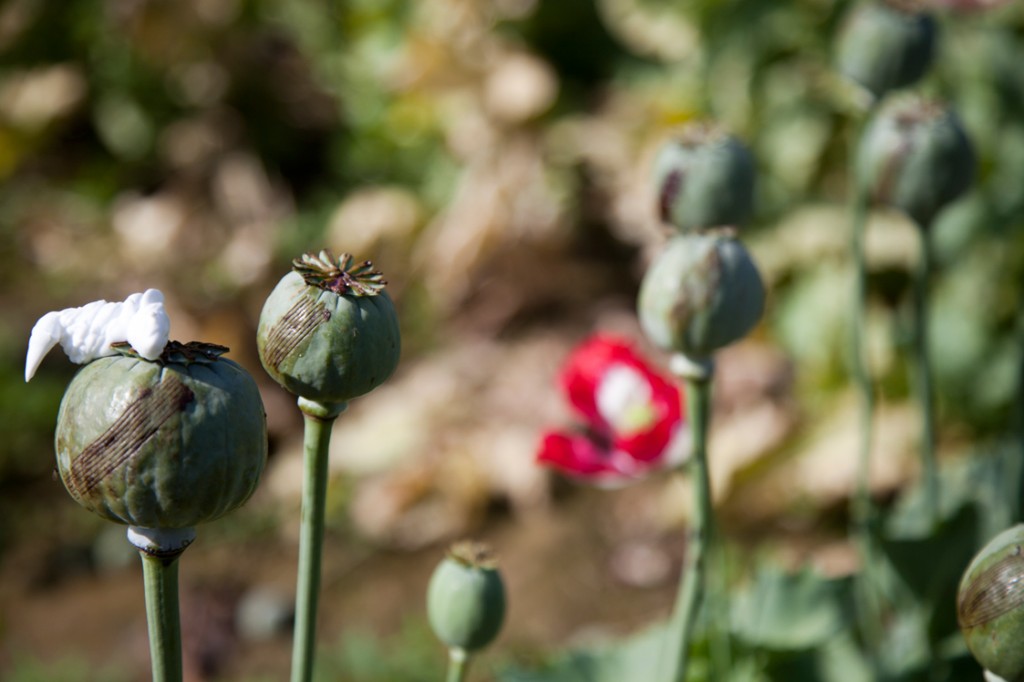
Scored poppy plants await the final harvest in Sangin, Helmand province, Afghanistan April 24, 2012. The annual poppy harvest yields the largest profit of the year for local Afghan farmers, ultimately resulting in 90 percent of the world’s opium supply.
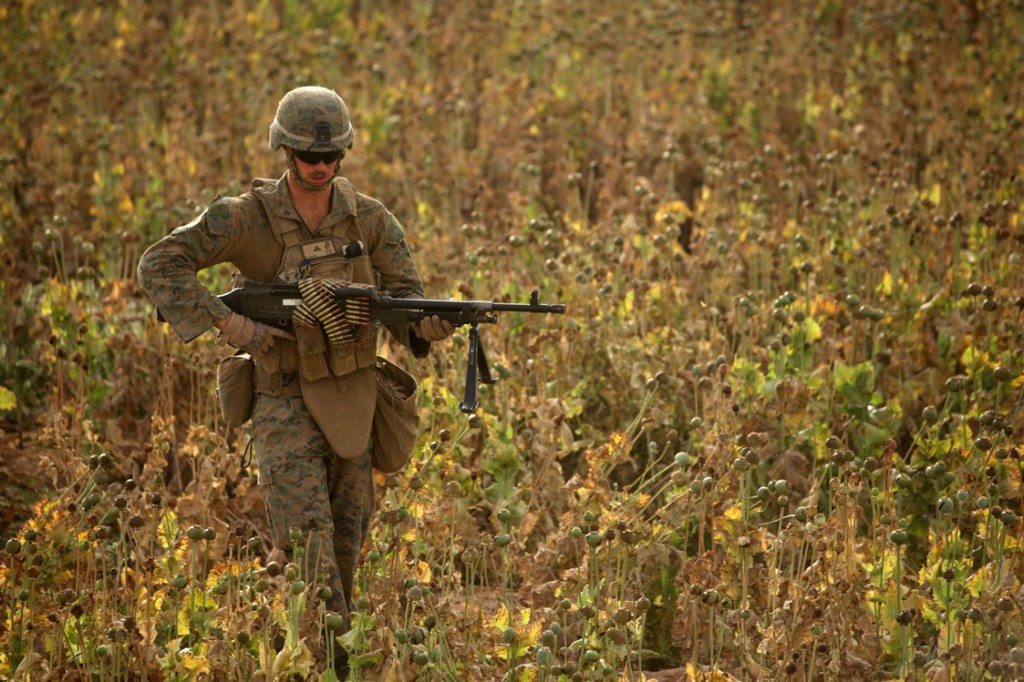
Scored poppy plants await the final harvest in Sangin, Helmand province, Afghanistan April 24, 2012. The annual poppy harvest yields the largest profit of the year for local Afghan farmers, ultimately resulting in 90 percent of the world’s opium supply.
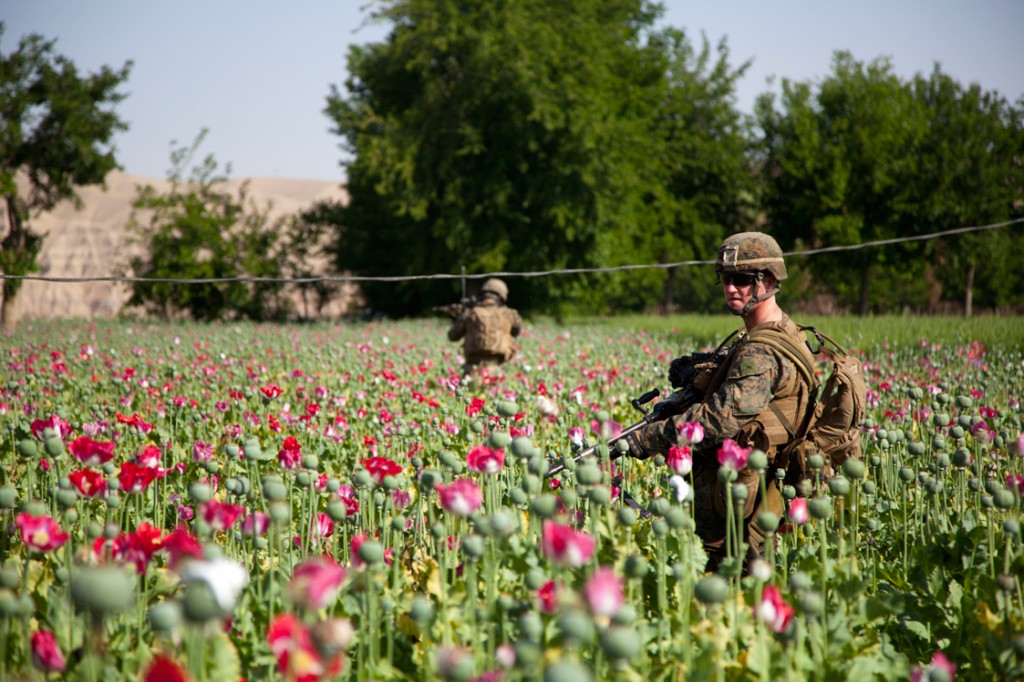
U.S. Marine Corps Lance Cpl. Michael Hanley, right, a machine gunner with 2D Squad, 1st Platoon, Bravo Company, 1st Battalion, 7th Marine Regiment, Regimental Combat Team 6, patrols through a field of poppy outside of Patrol Base Fires, Helmand province, Afghanistan April 24, 2012. Marines conducted the patrol to interact with the local populace and gather information on enemy activity in the area.
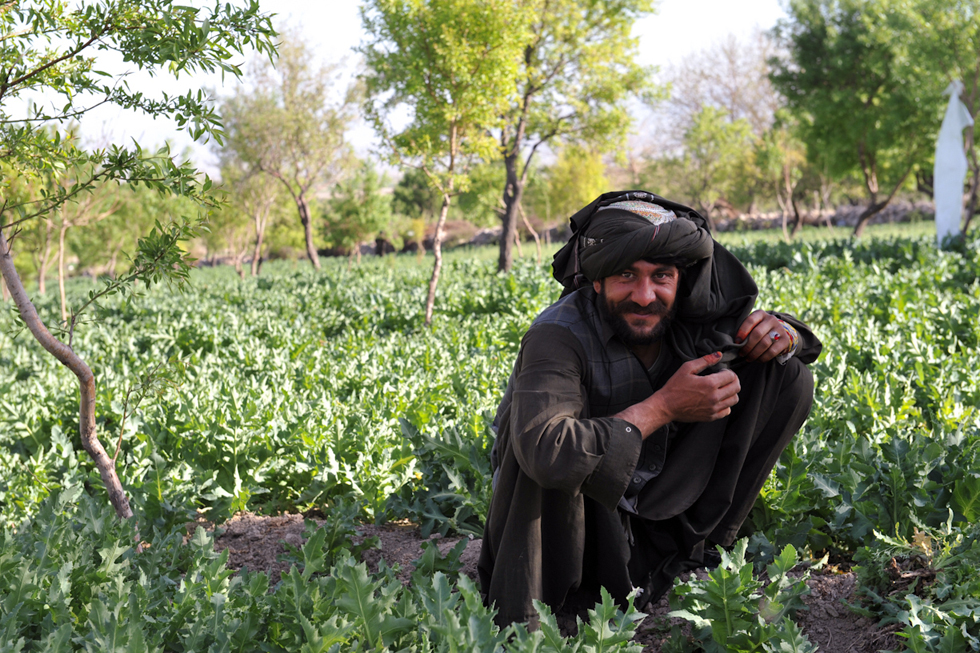
An Afghan farmer watches from a poppy field as the 288th Sapper Company, a National Guard Unit out of Houston, Miss., performs a dismounted patrol in the Uzugan province in southern Afghanistan, April 2, 2012. Dismounted patrols, in conjunction with their route clearance missions, have lead to a significant decrease in insurgent activity in the Dorifshan and Baluchi valleys and an increase in not only the safety and security of the coalition and Afghan Security Forces, but also helped the unit form a bond with the local Afghan civilians.
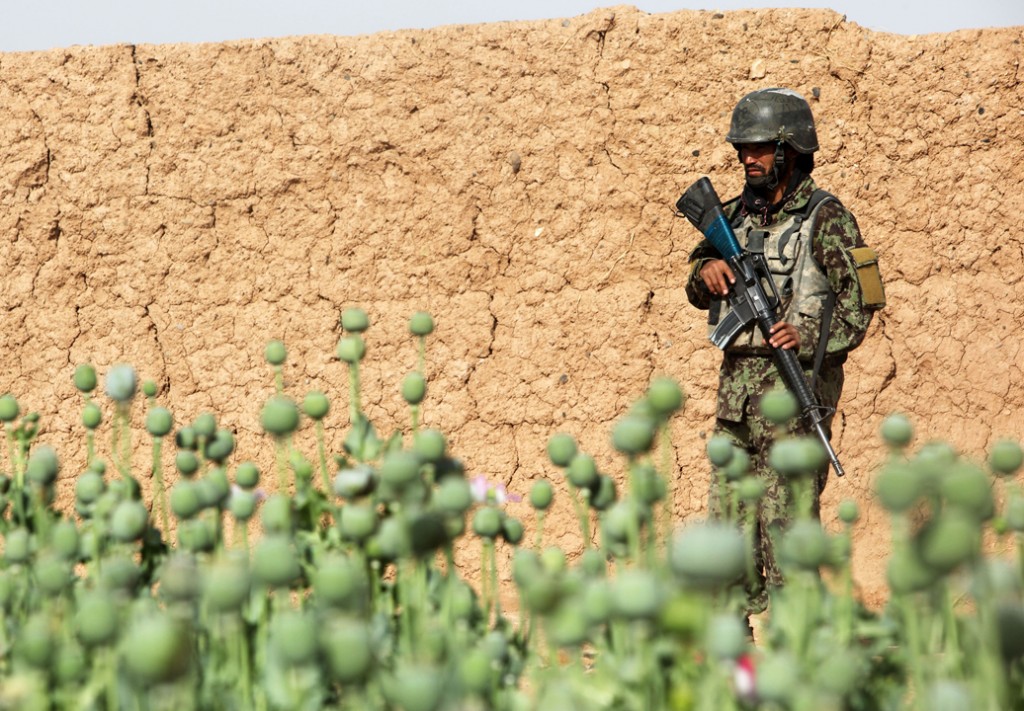
An Afghan National Army (ANA) soldier provides security during a satellite patrol along a poppy field in Marjah, Afghanistan, April 17, 2012. The ANA took part in a five day partnered operation to erect Patrol Base Sledgehammer Four and disrupt insurgent activity in the area. (U.S. Marine Corps photo by Lance Cpl. David A. Perez/Released)
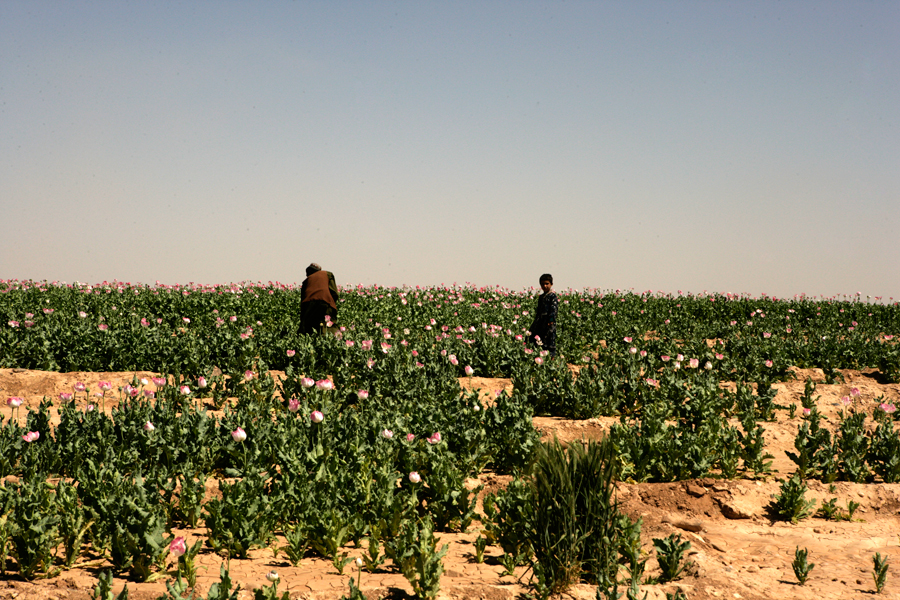
A field filled with opium poppy plants can be seen April 11, 2012, in Marjah, Afghanistan. Heroin is derived from raw opium gum, which comes from opium poppies. (U.S. Marine Corps photo by Sgt Michael P. Snody)
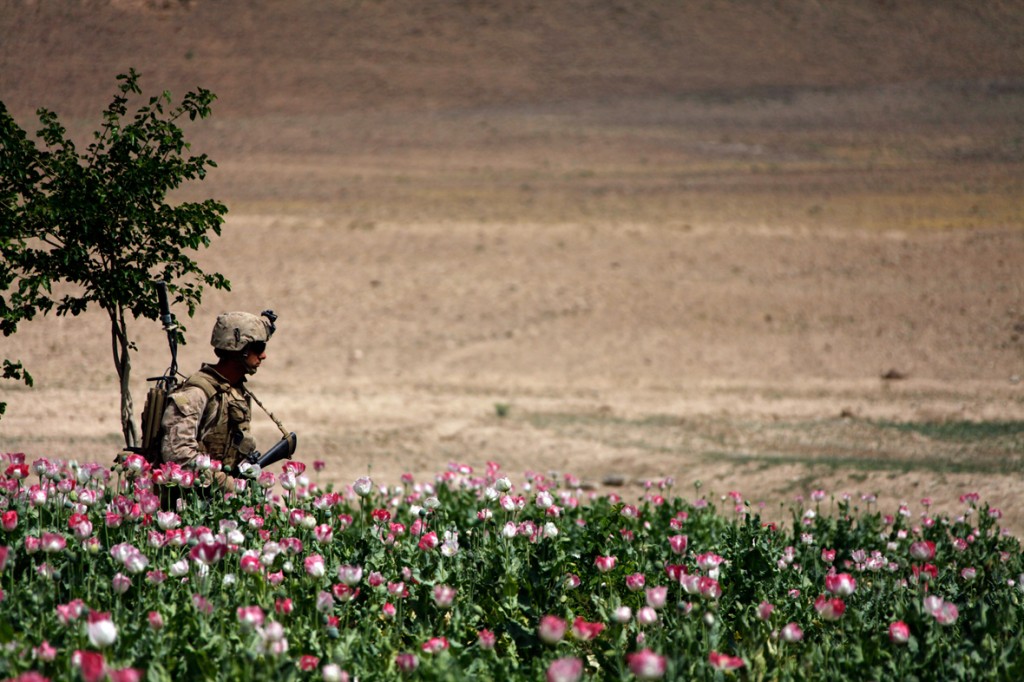
A U.S. Marine with Charlie Company, 1st Battalion, 8th Marine Regiment, Regimental Combat Team 6 walks through a poppy field during a security patrol in Gorazan Valley, Helmand province, Afghanistan, April 17, 2012. Marines conducted the patrol in search of suspected enemy fighters. (U.S. Marine Corps photo by Cpl. Andrew J. Good)
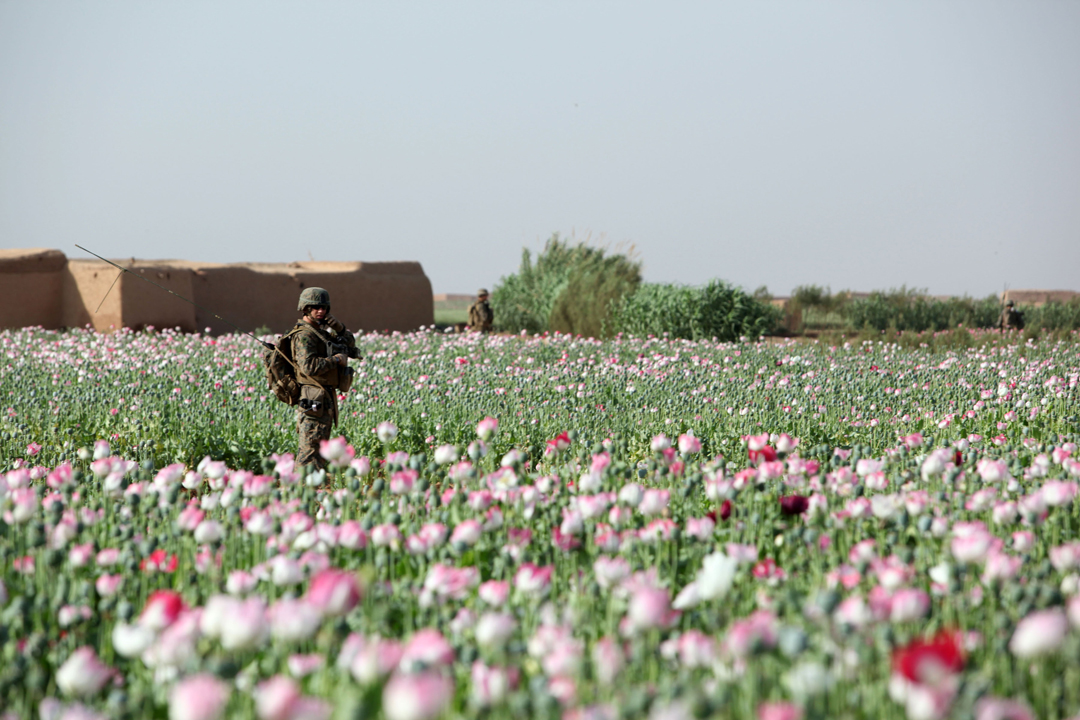
U.S. Marines with Combined Anti-Armor Team, Weapons Company, 2nd Battalion, 9th Marine Regiment, Regimental Combat Team 5, conduct a satellite patrol through a poppy field in Marjah, Afghanistan, April 19, 2012. CAAT conducted a five day partnered operation to erect Patrol Base Sledgehammer Four and disrupt insurgent activity in the area. (U.S. Marine Corps photo by Lance Cpl. David A. Perez)
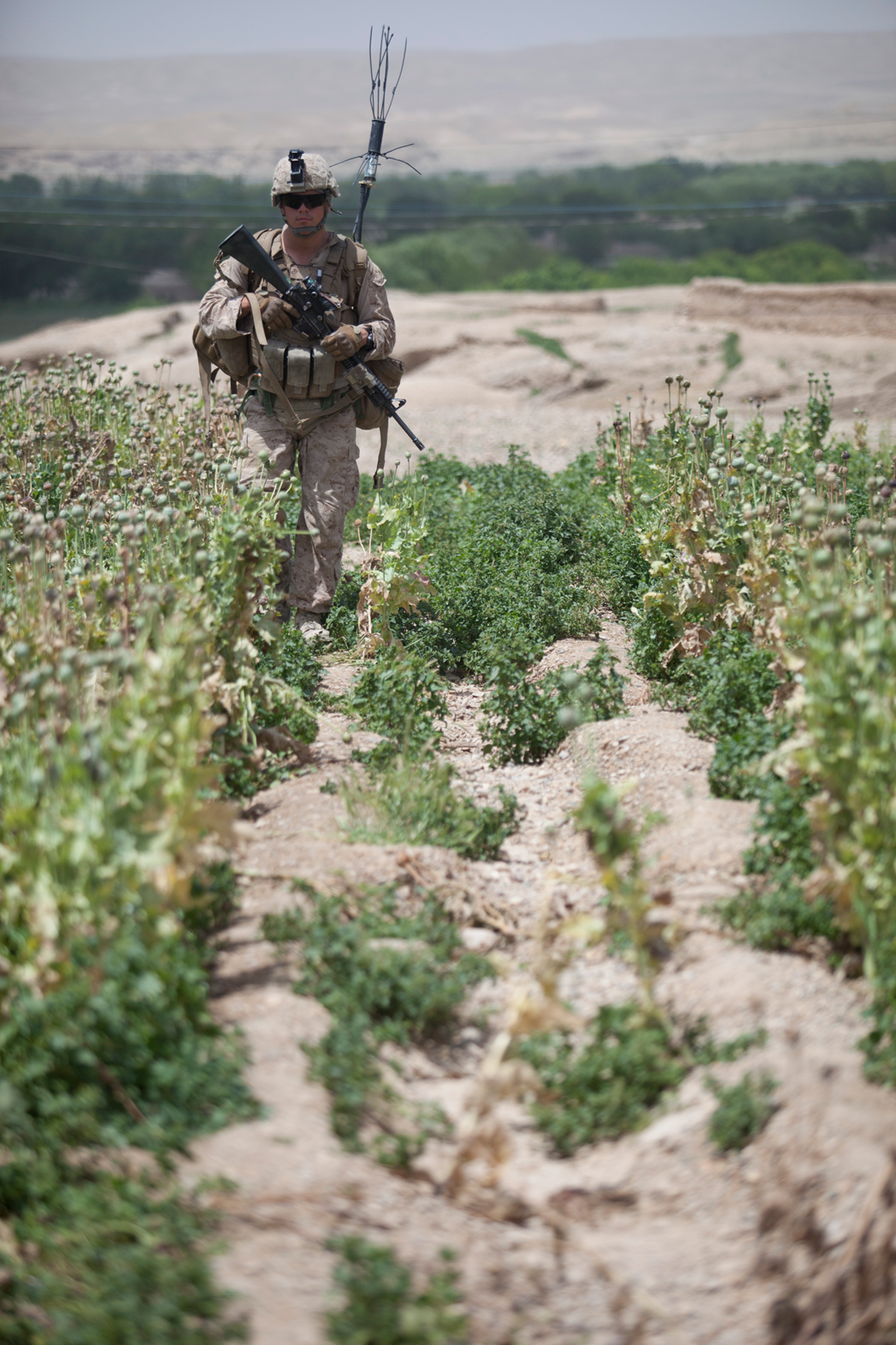
U.S. Marine Corps Lance Cpl. Nicholas Gonzalez, a machine gunner with 2nd Squad, 2nd Platoon, Charlie Company, 1st Battalion, 7th Marine Regiment, Regimental Combat Team 6, patrols through a poppy field in Sangin, Helmand province, Afghanistan, April 27, 2012. Marines conducted the patrol to provide security in the area and interact with the local population.
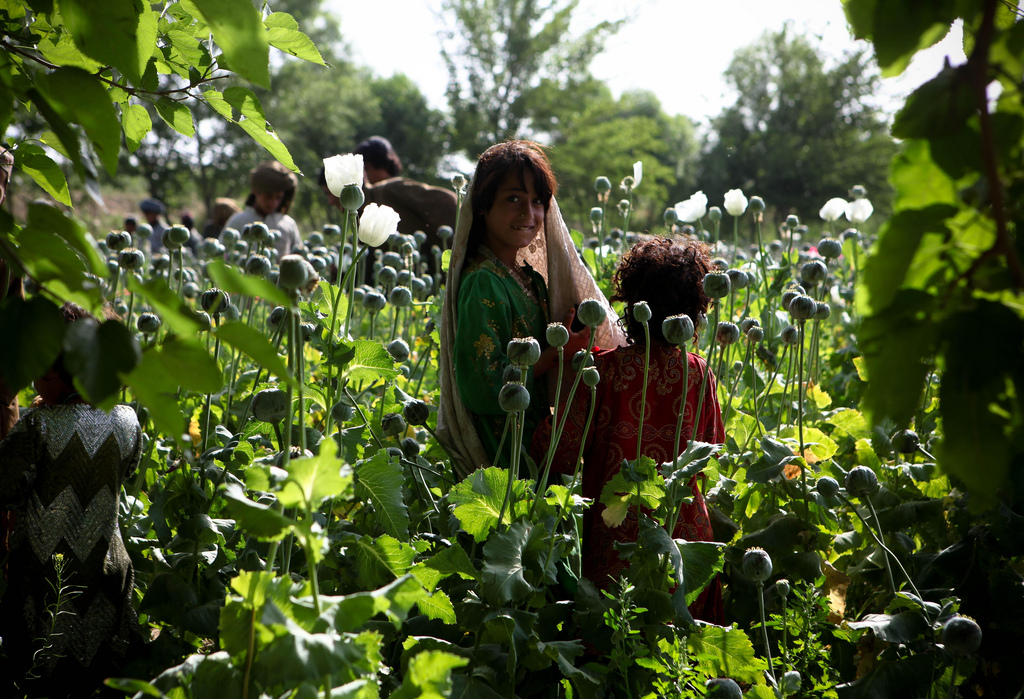
PATROL BASE SHARK, Helmand province, Islamic Republic of Afghanistan – A small girl looks back after receiving a candy bar from a Marine outside the base. The Marines give these small gifts to help gain the trust of young children, who are the future of Afghanistan. The children have become much more receptive to Marines after a decade in the country.
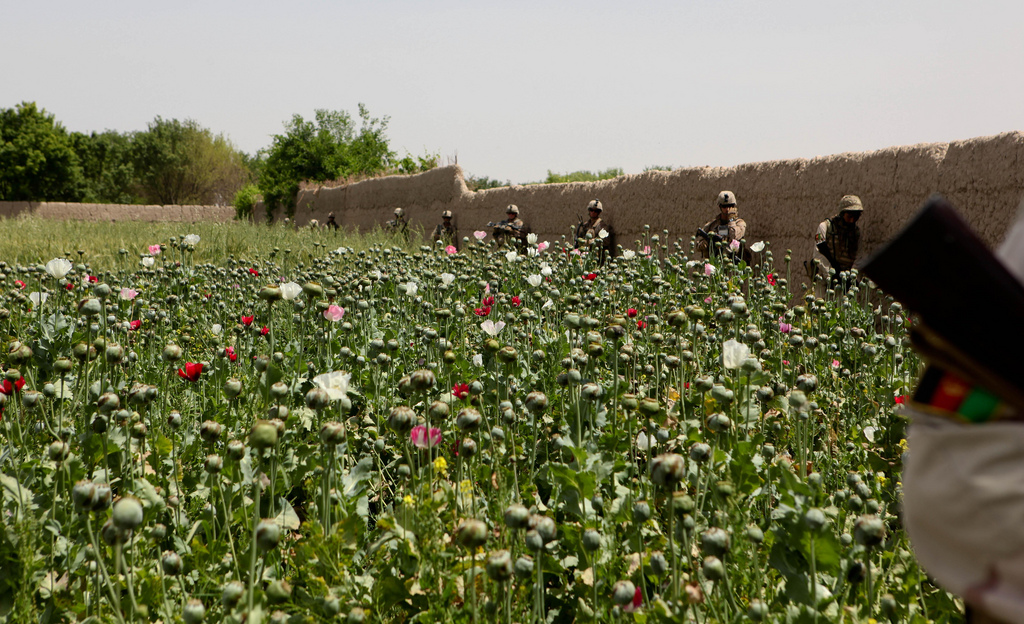
PATROL BASE SHARK, Helmand province, Islamic Republic of Afghanistan – Marines and Afghan National Army soldiers patrol through farmlands outside the base recently. Behind the small poppy field in the front of the photo is a wheat field. The local farmers are growing more and more of the wheat as an alternative to growing the illegal poppy.
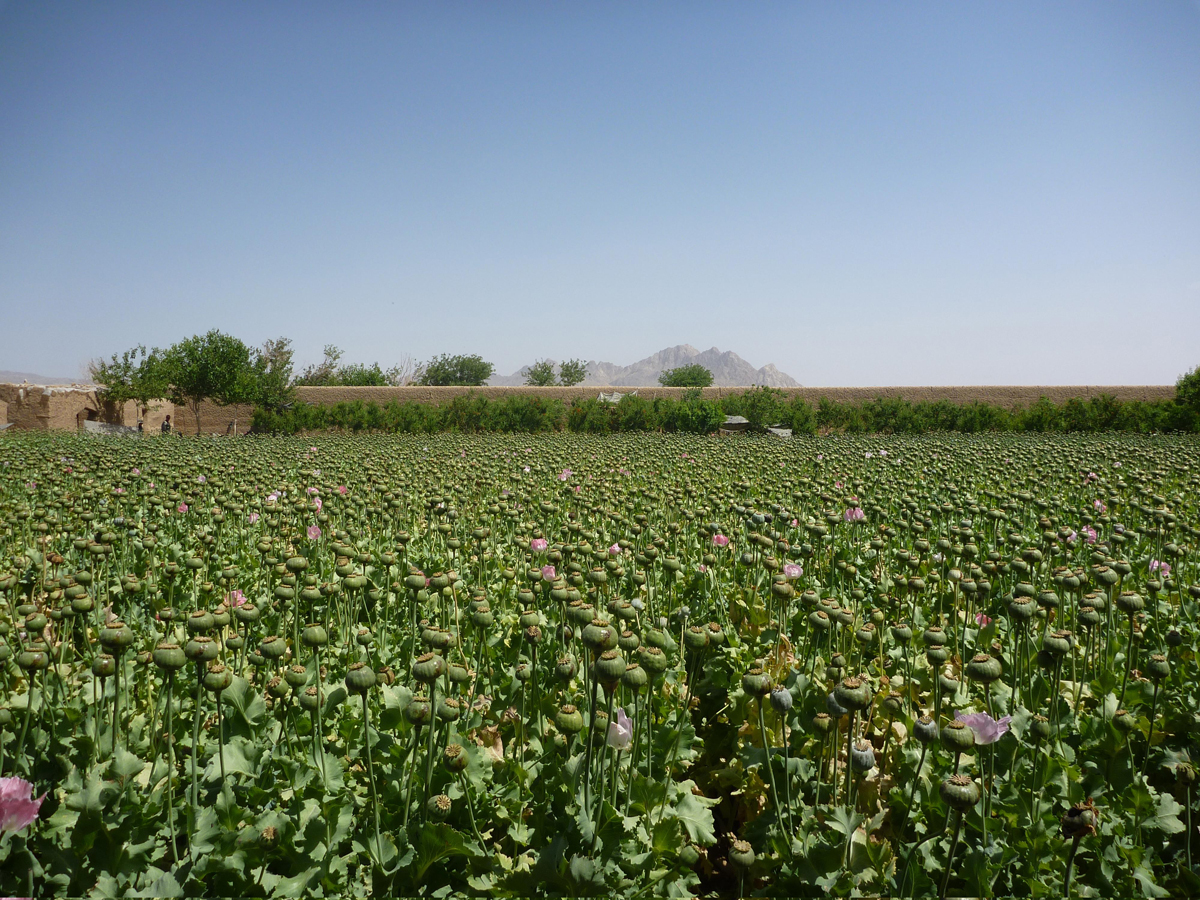
Poppies grow in a field in the Maiwand district, Kandahar province, Afghanistan, May 2, 2011. (U.S. Army photo by Sgt. Dillon Townsel/Released)
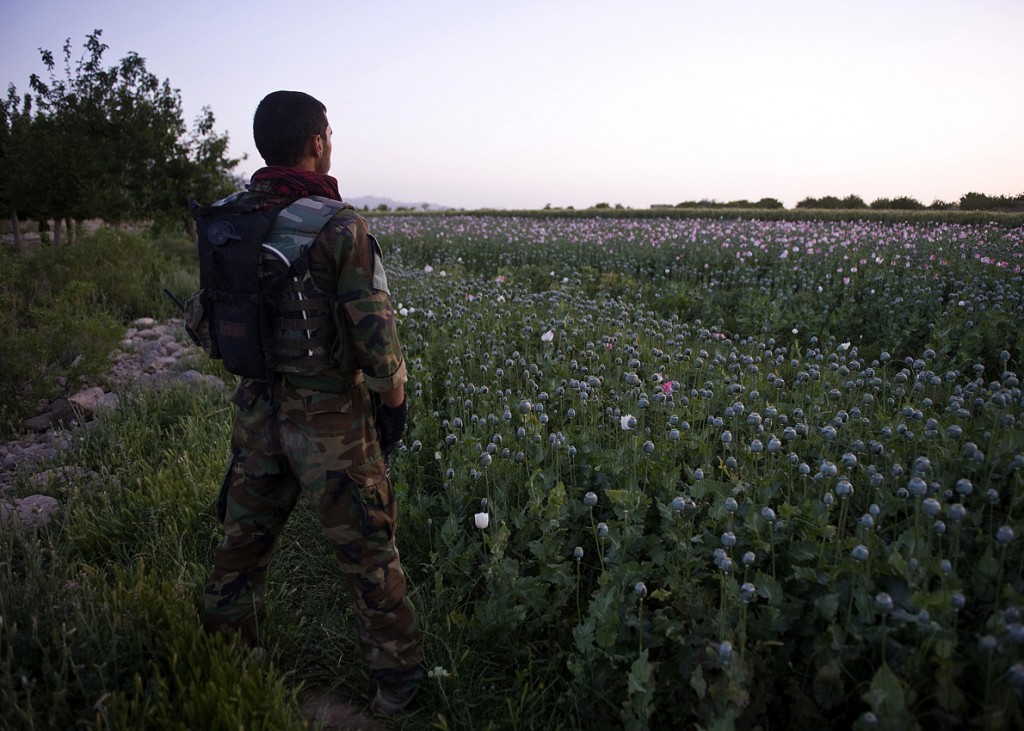
An Afghan commando with the Afghan National Army’s 3rd Commando Kandak scans the surrounding area for enemy activity during a clearing operation in Maiwand District, May 1, Kandahar province, Afghanistan. The commandos, joined by Navy SEALs team members with Special Operations Task Force – South and members of the Afghan National Civil Order Police, destroyed an IED and recovered IED making materials and a weapons cache during the operation.
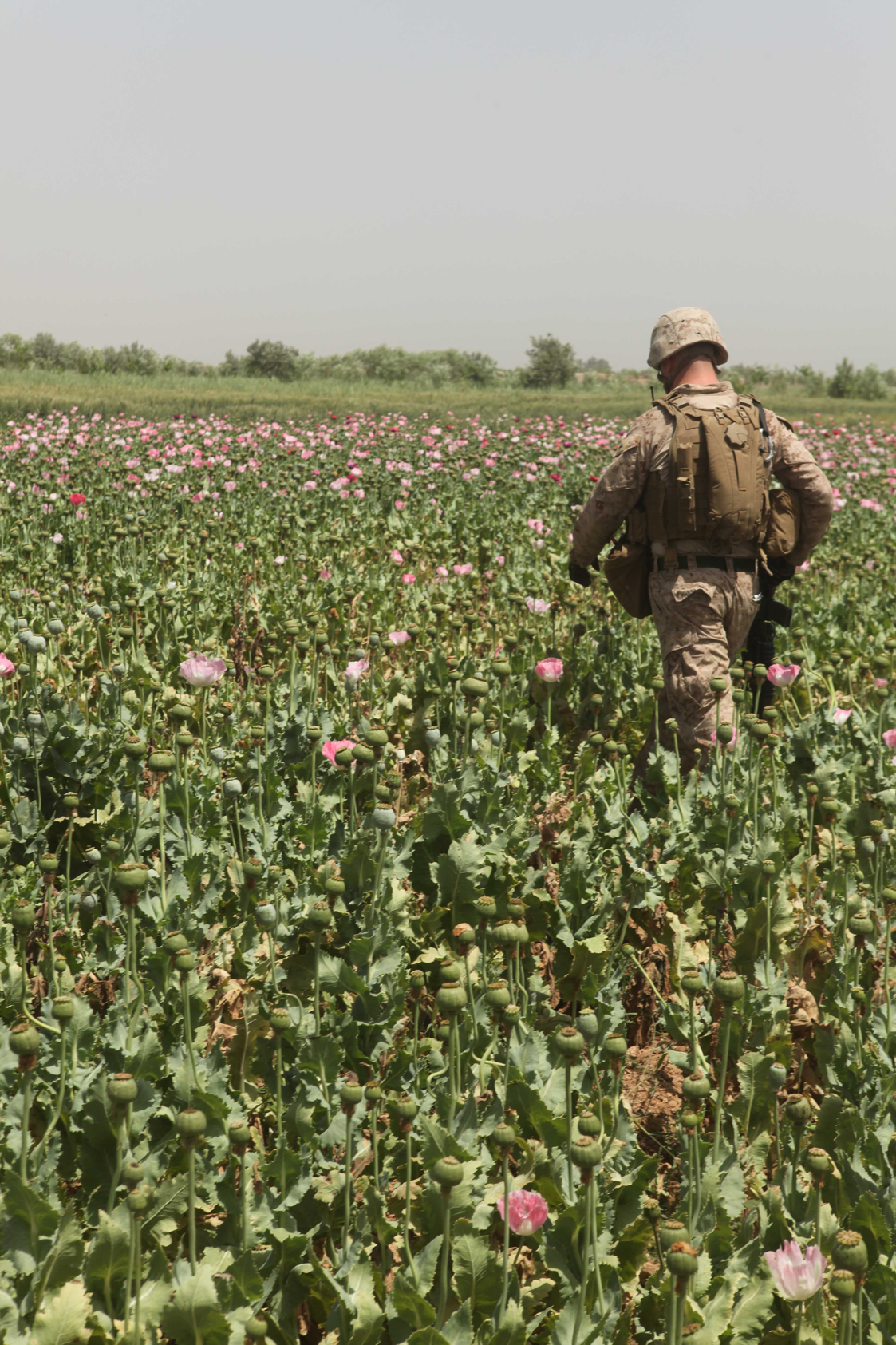
U.S. Marine Corps Lance Cpl. Jason Phillips crosses a poppy field as Marines conduct a security patrol outside Forward Operating Base Hanson, Marjah, Afghanistan, April 30, 2011. The security patrol was done in order for Marines to inspect the well being of a nearby village. Phillips is with Guard Force, 2nd Battalion, 8th Marines, Regimental Combat Team 1. (U.S. Marine Corps photo by Lance Cpl. Alberto B. Vazquez/Released)
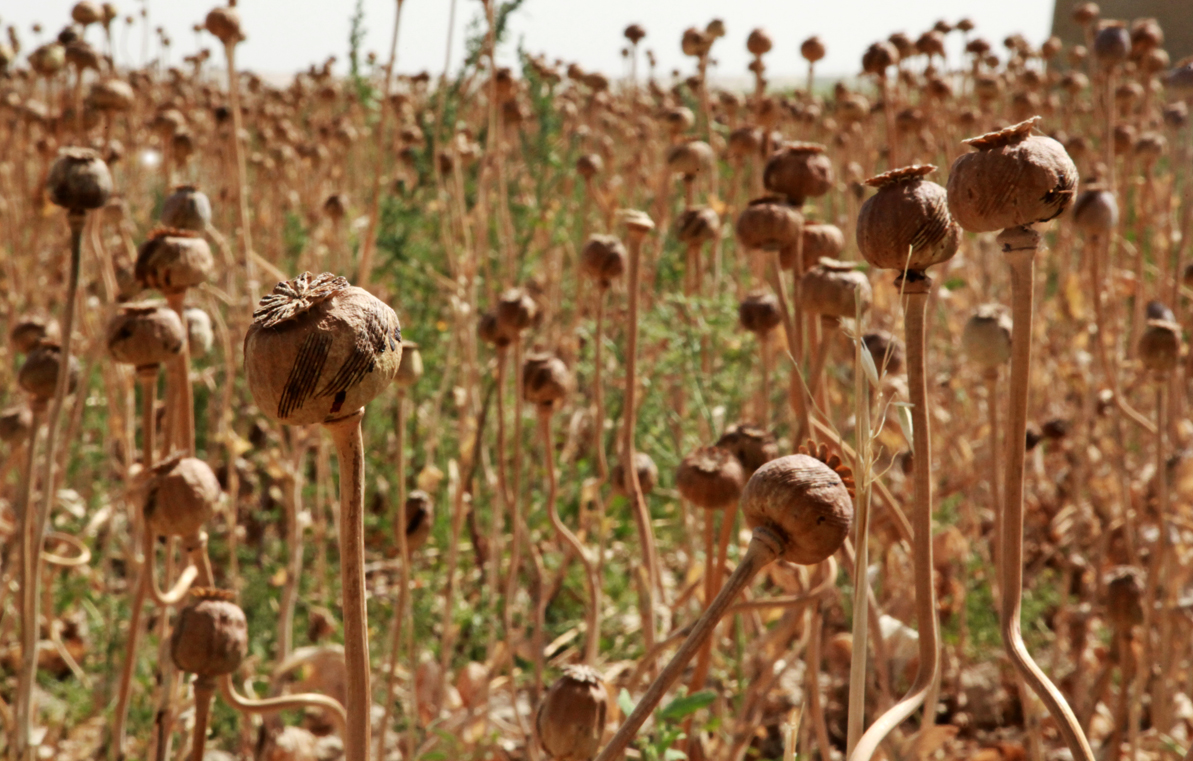
Dried out opium poppy plants occupy a field at Khan Neshin, Afghanistan, May 27, 2011. Afghan farmers harvest the scorn poppy bulbs from the plant to produce opium paste. (U.S. Marine Corps photo by Cpl. Charles T. Mabry II/Released)
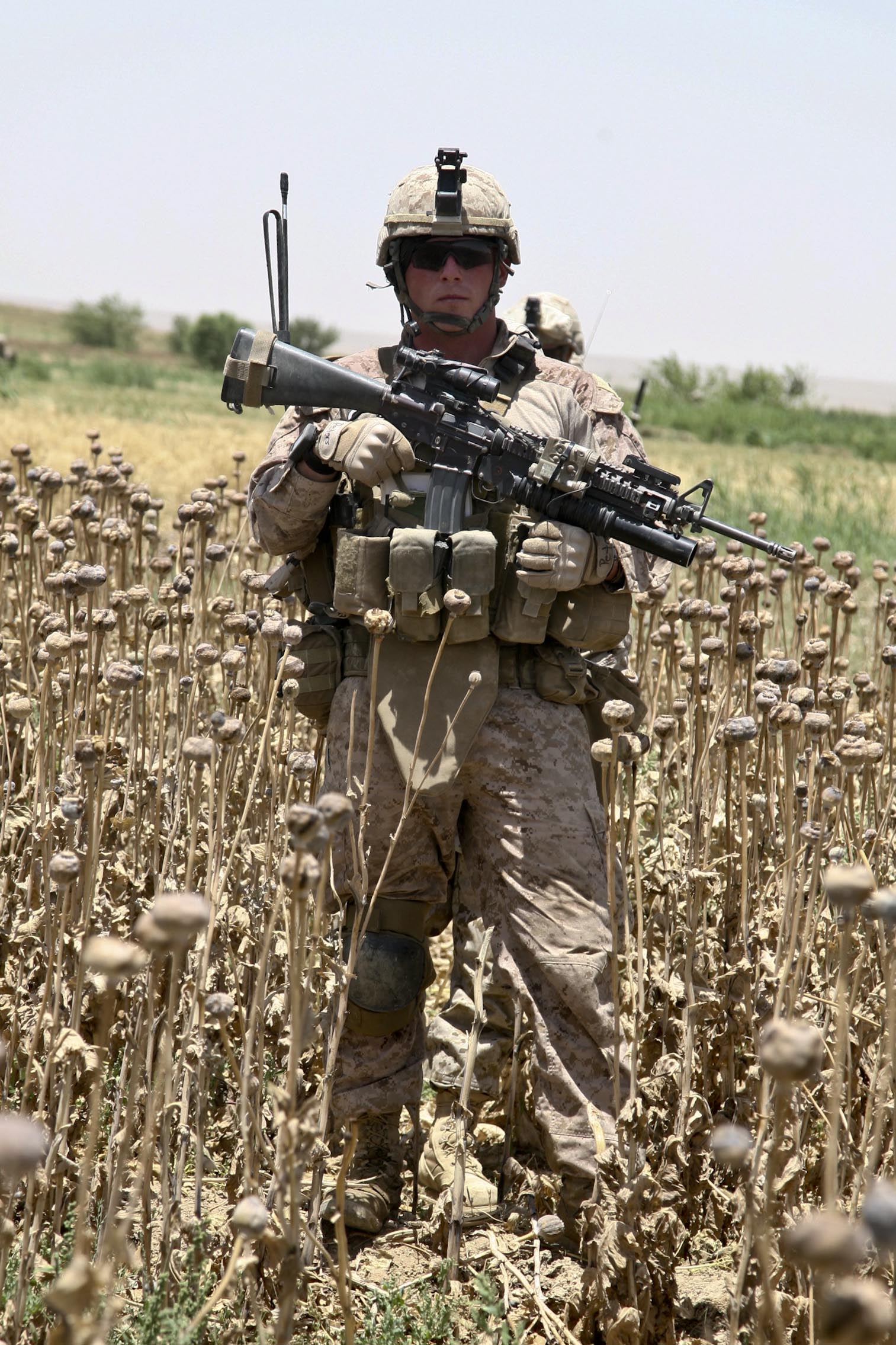
U.S. Marine Corps Cpl. James K. Peters stands in an opium poppy field while performing a foot patrol at Sangin, Afghanistan, May 19, 2011. Peters and his fellow Marines assigned to Weapons Company, 3rd Battalion, 4th Marine Regiment, Regimental Combat Team 8, are familiarizing the battalion?s commander with their area of operation during the patrol. (U.S. Marine Corps photo by Cpl. Jeremy C. Harris/Released)
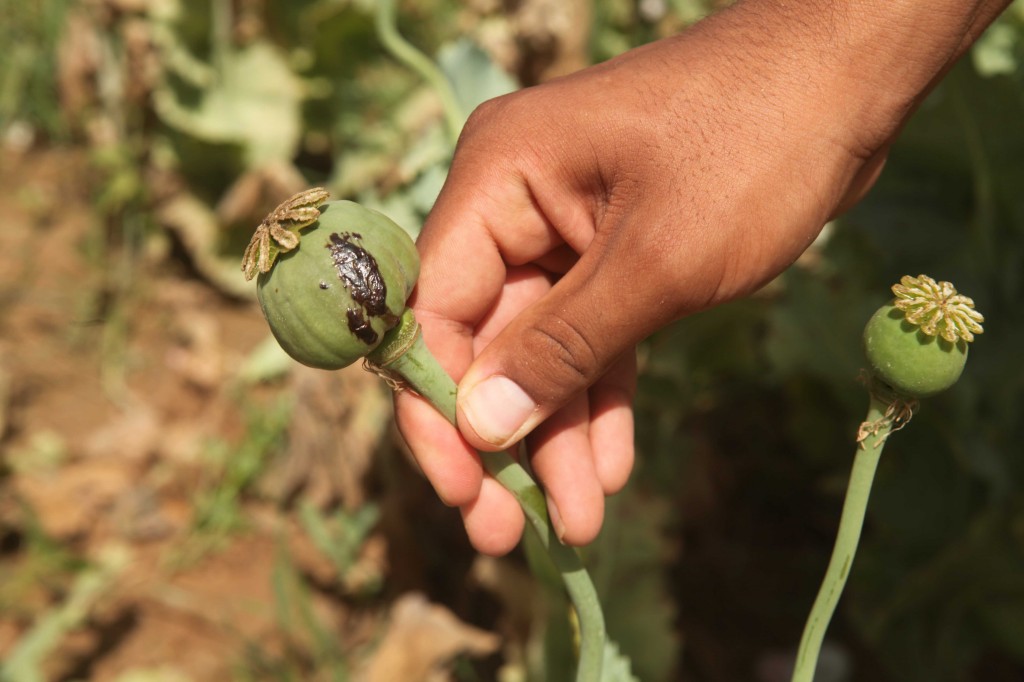
A U.S. Marine displays a poppy flower after its been scored as Marines conduct a security patrol outside Forward Operating Base Hanson, Marjah, Afghanistan, April 30, 2011. The security patrol was done in order for Marines to inspect the well being of a nearby village. The Marines are with Guard Force, 2nd Battalion, 8th Marines, Regimental Combat Team 1. (U.S. Marine Corps photo by Lance Cpl. Alberto B. Vazquez/Released)
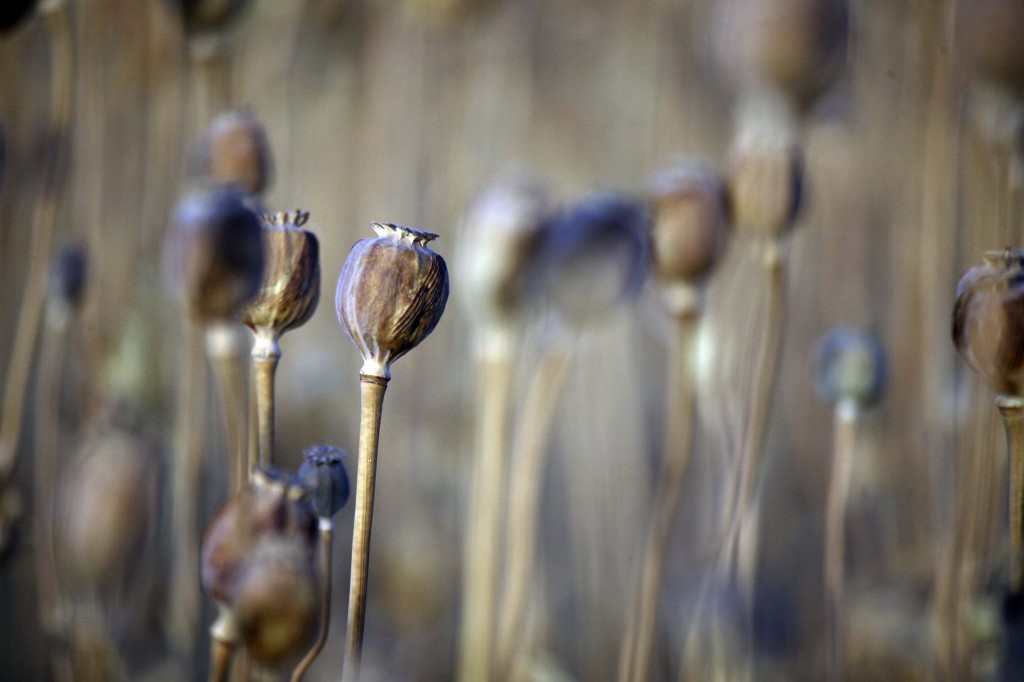
Dried, scored poppies remain after the harvest season as U.S. Marines with 1st Platoon, Bravo Company, 1st Battalion, 23rd Marine Regiment, Regimental Combat Team 1 conduct a patrol outside Combat Outpost (COP) Huskers in Helmand province, Afghanistan, May 22, 2011. The Marines patrolled outside the COP in order to maintain security and talk with villagers. (U.S. Marine Corps photo by Staff Sgt. Loren P. Molumby/Released)
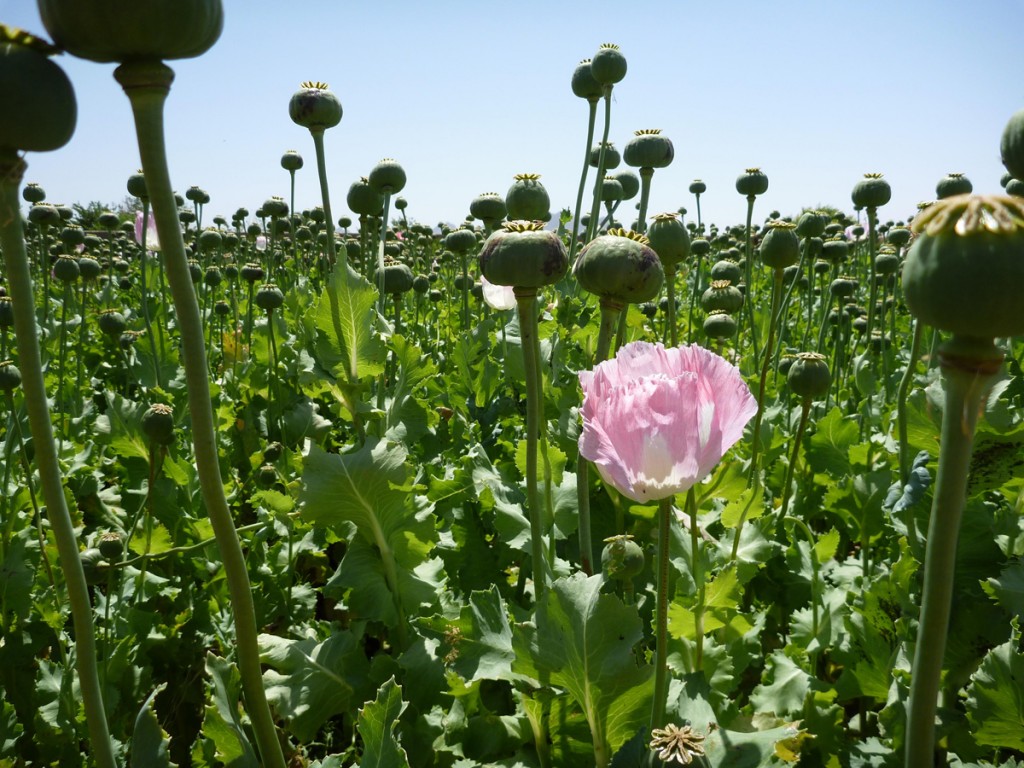
Poppy fields of the Maiwand District, taken May 2.
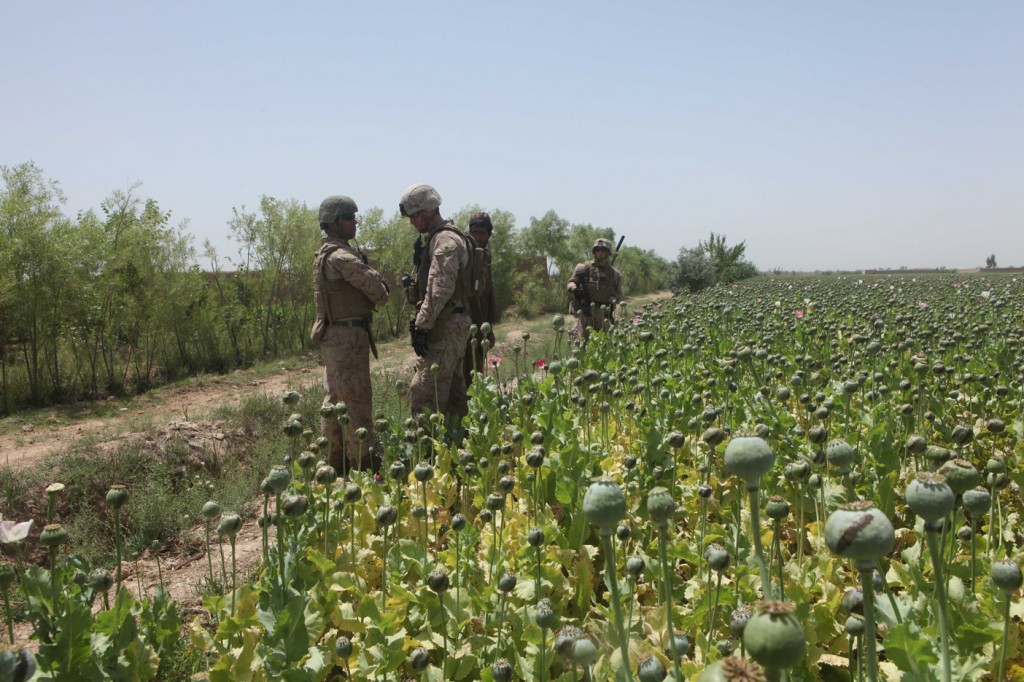
U.S. Marine Corps Cpl. Mathew J. Gilabriest speaks with a villager as Marines conduct a security patrol outside Forward Operating Base Hanson, Marjah, Afghanistan, April 30, 2011. The security patrol was done in order for Marines to inspect the well being of a nearby village. Gilabriest is with Guard Force, 2nd Battalion, 8th Marines, Regimental Combat Team 1. (U.S. Marine Corps photo by Lance Cpl. Alberto B. Vazquez/Released)
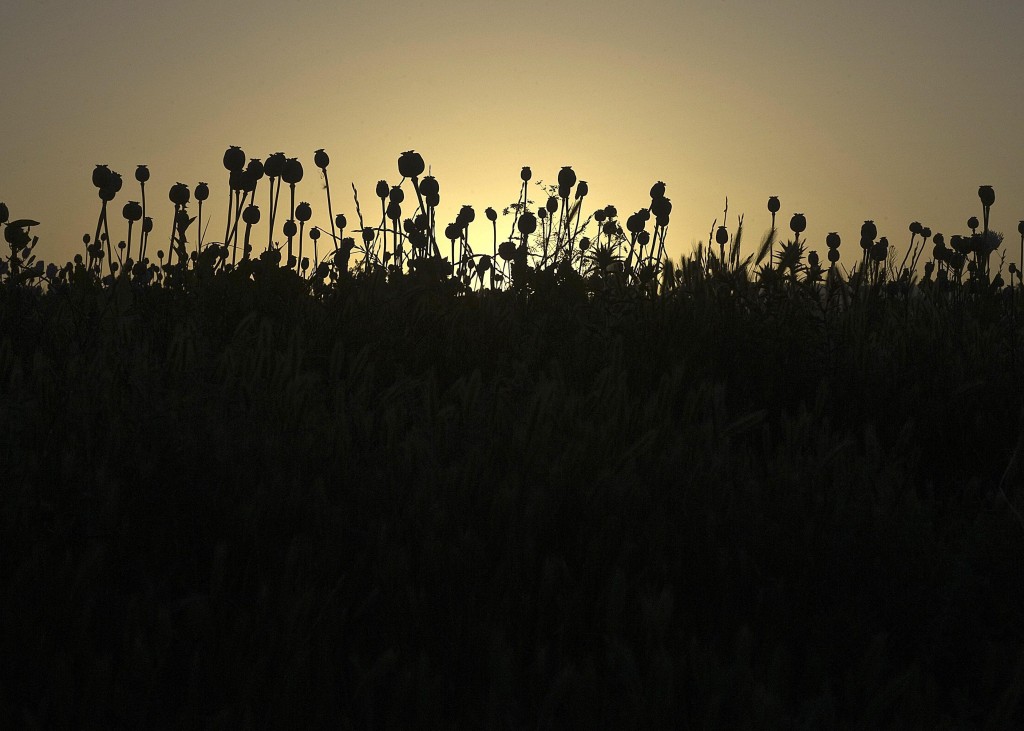
The sun rises over a poppy field during a clearing operation conducted by Afghan Commandos with the Afghan National Army’s 3rd Commando Kandak in Maiwand District, May 1, Kandahar province, Afghanistan. The commandos, joined by Navy SEALs team members with Special Operations Task Force South and members of the Afghan National Civil Order Police, destroyed an IED and recovered IED making materials and a weapons cache during the operation.
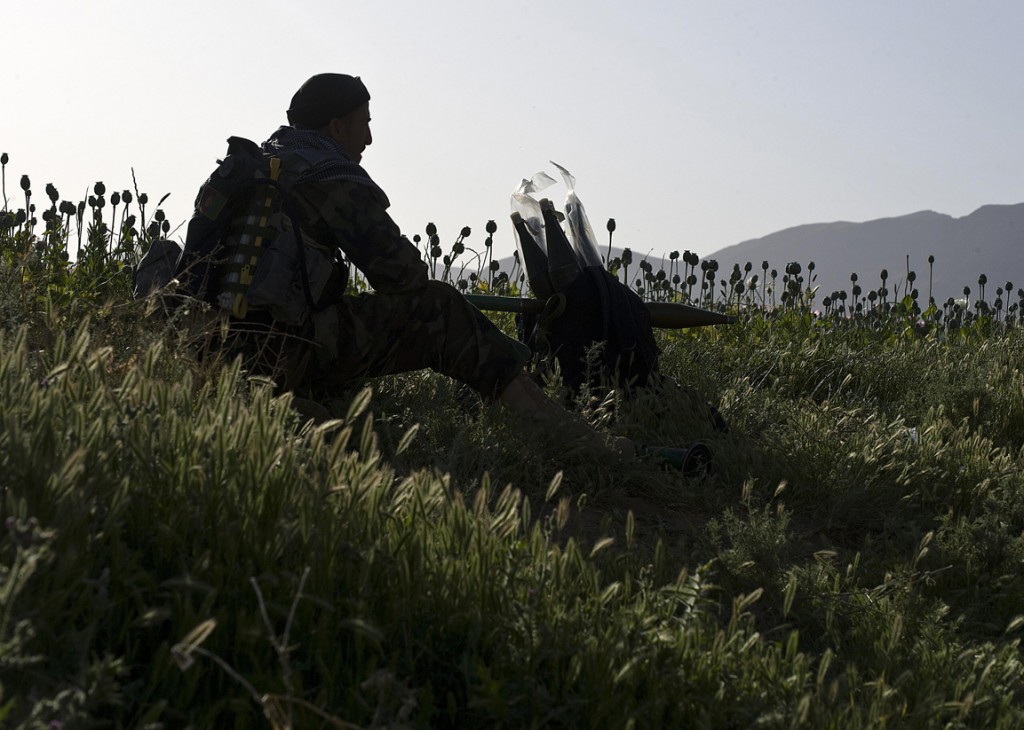
An Afghan commando with the Afghan National Army’s 3rd Commando Kandak scans the surrounding area for enemy activity during a clearing operation in Maiwand District, May 1, Kandahar province, Afghanistan. The commandos, joined by Navy SEALs team members with Special Operations Task Force – South and members of the Afghan National Civil Order Police, destroyed an IED and recovered IED making materials and a weapons cache during the operation.
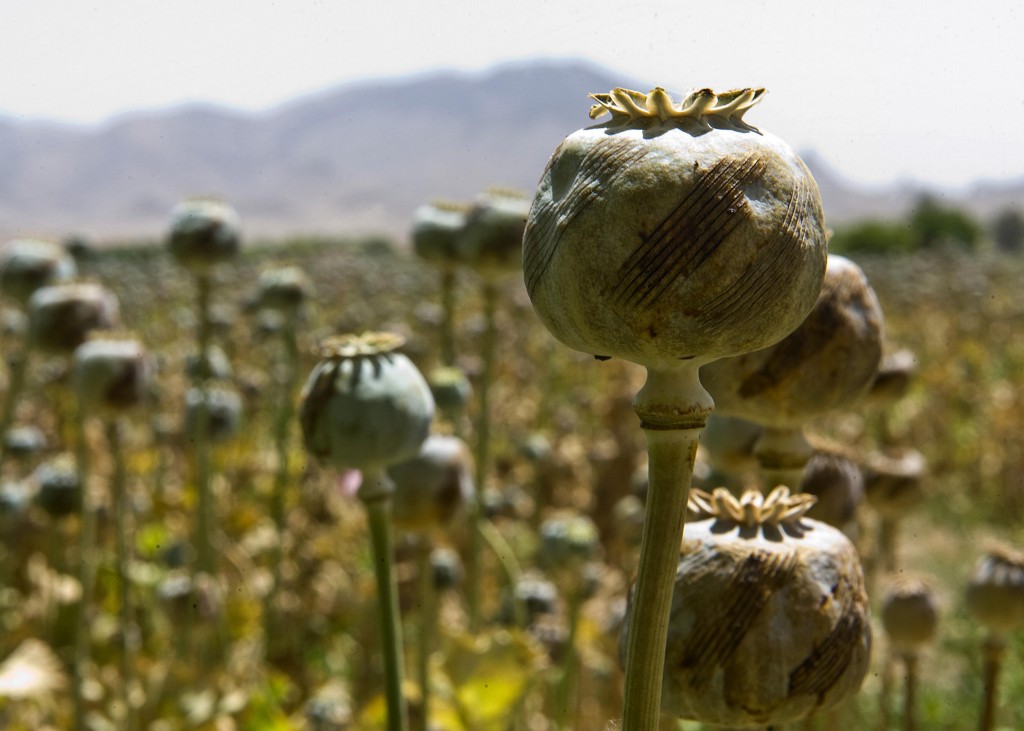
A field of scored poppies, as seen during a clearing operation conducted by Afghan commandos with the Afghan National Army’s 3rd Commando Kandak in Maiwand district, May 1, Kandahar province, Afghanistan. Poppy is cultivated and harvested for its powerful medicinal properties.
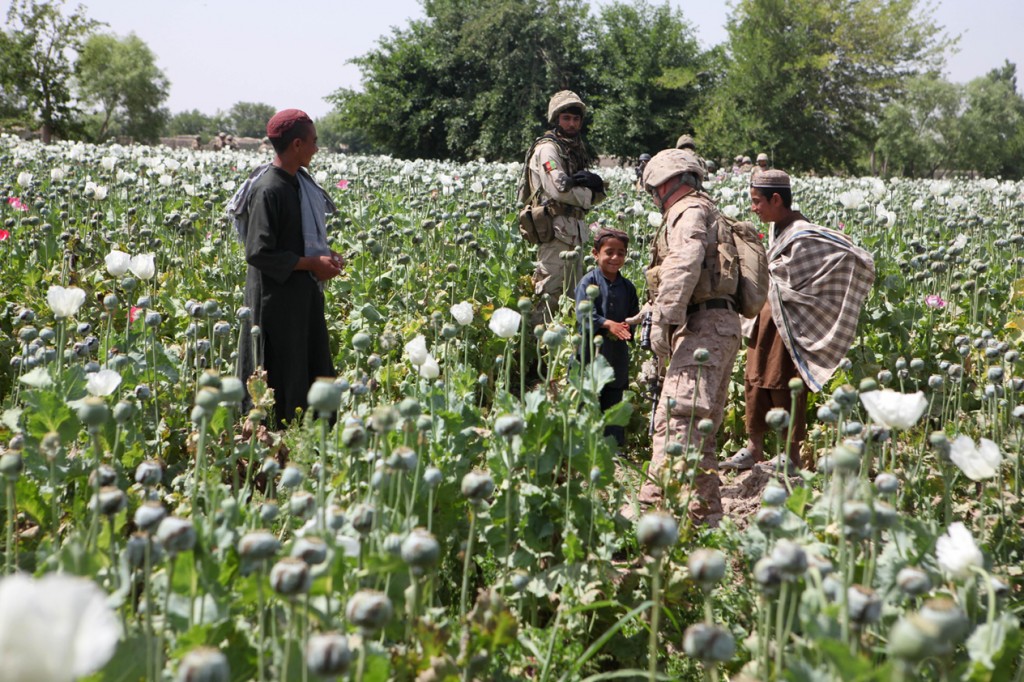
PATROL BASE SHARK, Helmand province, Islamic Republic of Afghanistan – A Marine with 3rd Battalion, 4th Marine Regiment, greets local children working in the farmlands near the base. The high-five exchanged is a symbol of the positive relationship the Marines have built with the local population.
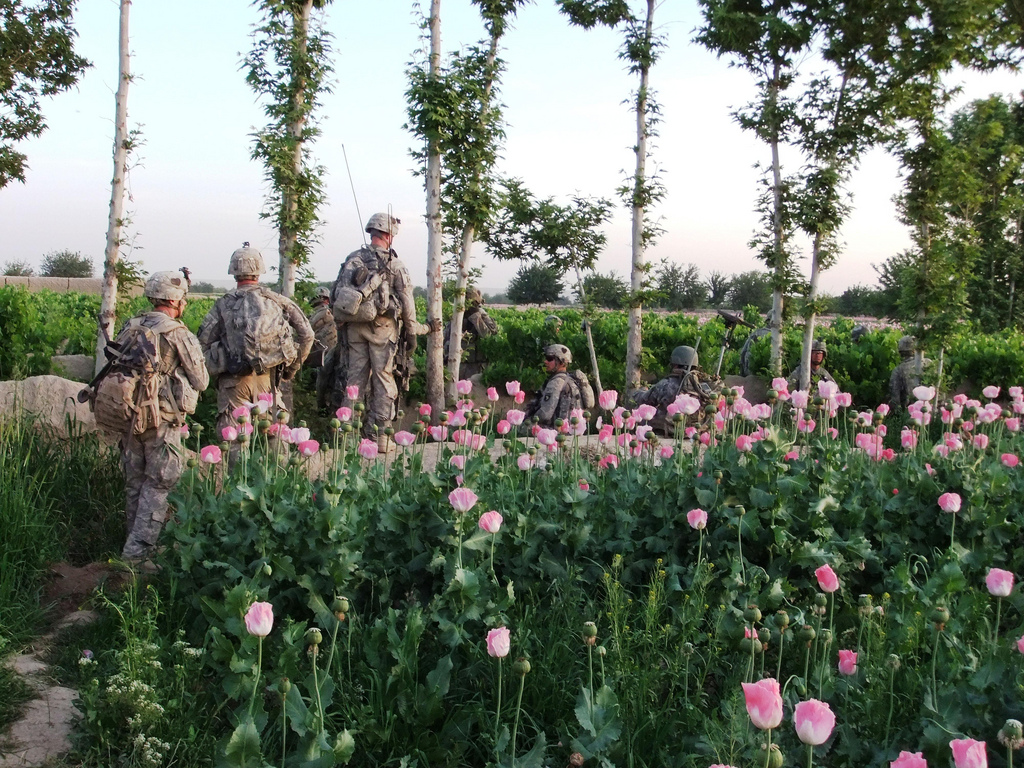
U.S. Marine Corps Sgt. Eric Stump (3rd from left), a squad leader with with 1st Platoon, Company I, Battalion Landing Team 3/8, Regimental Combat Team 8, and his U.S. Marines discuss their route through a poppy field during a security patrol from their patrol base in Helmand province’s Green Zone, west of the Nahr-e Saraj canal, April 13. Elements of 26th Marine Expeditionary Unit deployed to Afghanistan to provide regional security in Helmand province in support of the International Security Assistance Force.
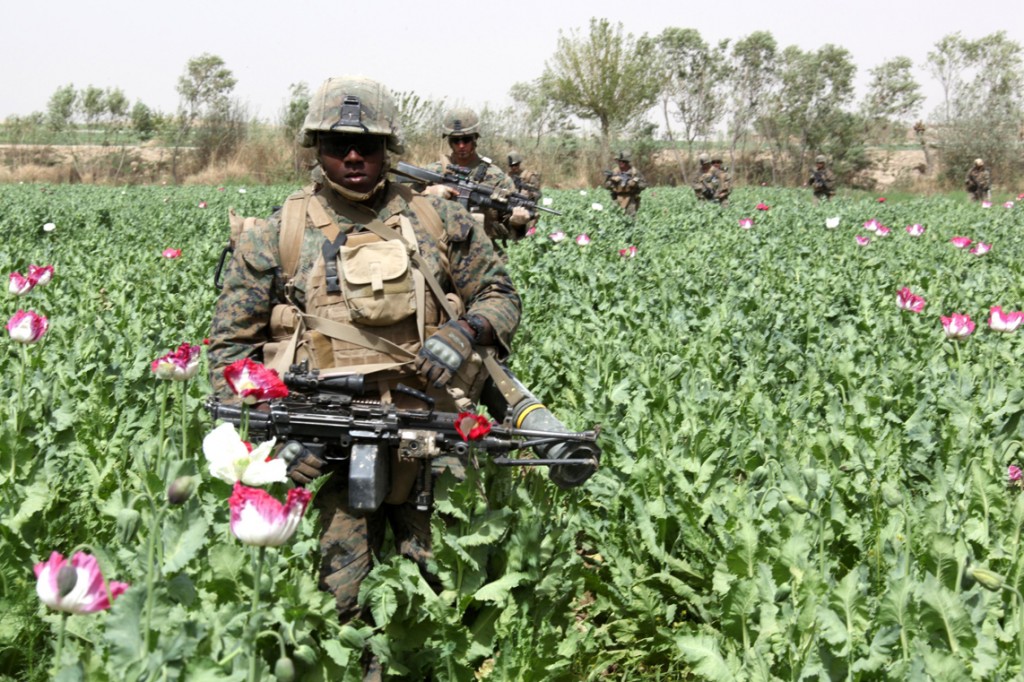
U.S. Marine Corps Lance Cpl. Antonio Wilccoxen, an M249 Squad Automatic Weapon gunner, and fellow U.S. Marines with 1st Platoon, Company I, Battalion Landing Team 3/8, Regimental Combat Team 8, walk through a poppy field during a security patrol from their patrol base in Helmand province’s Green Zone, west of the Nar-e Saraj canal, March 31. Elements of 26th Marine Expeditionary Unit deployed to Afghanistan to provide regional security in Helmand province in support of the International Security Assistance Force.
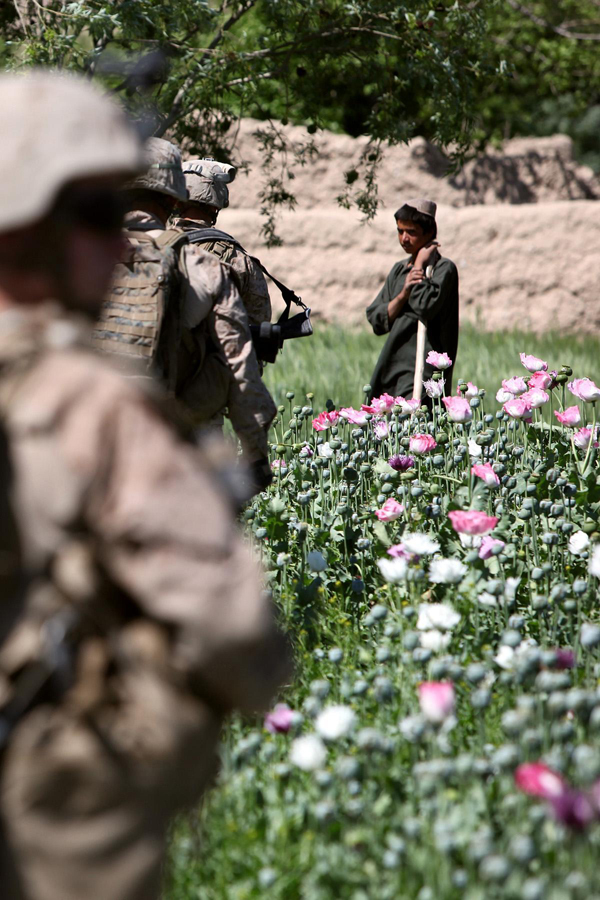
An Afghan boy watches Marines with Bravo Battery, 1st Battalion, 10th Marines, Regimental Combat Team-8, patrol a poppy field near the Kajaki green zone in Helmand province, Afghanistan, April 19. During daily patrols over the last several months Bravo Battery Marines have come to know the local kids as both a sign of familiarity and safety.
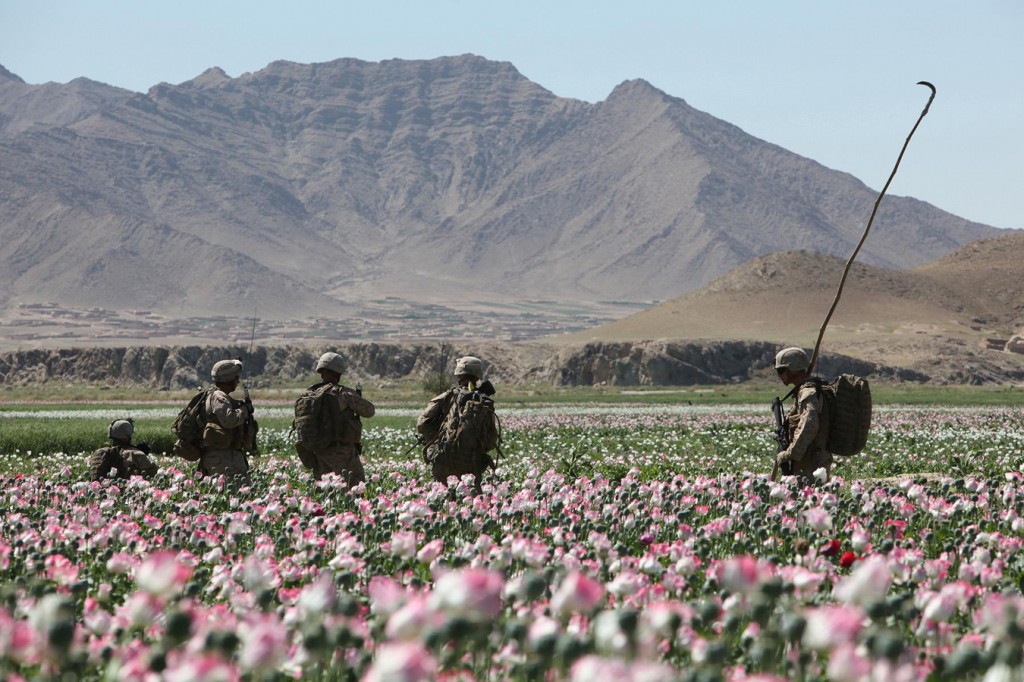
Marines with Bravo Battery, 1st Battalion, 10th Marines, Regimental Combat Team 8, patrol through a poppy field in the Kajaki green zone, Helmand province, Afghanistan, April 19. An artillery unit by doctrine, Bravo Battery has served as a provisional infantry rifle company for the last several months while protecting the area around the Kajaki Dam.
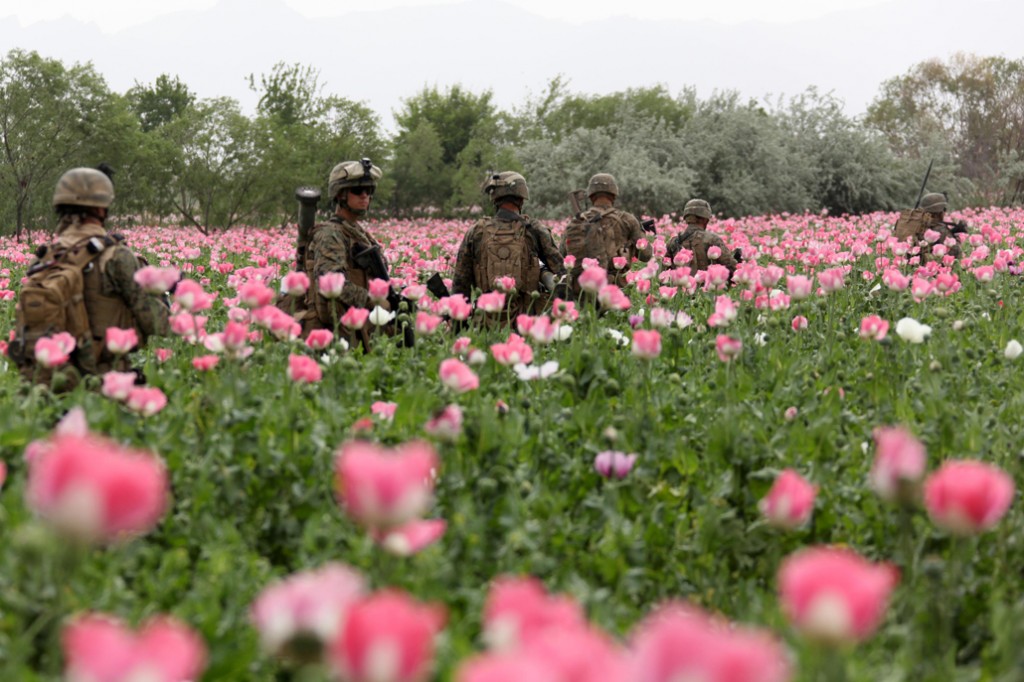
U.S. Marines with 1st Platoon, Company I, Battalion Landing Team 3/8, Regimental Combat Team 8, return to base through a poppy field after a security patrol from their patrol base in Helmand province’s Green Zone, west of the Nahr-e Saraj canal, April 13. Elements of 26th Marine Expeditionary Unit deployed to Afghanistan to provide regional security in Helmand province in support of the International Security Assistance Force.
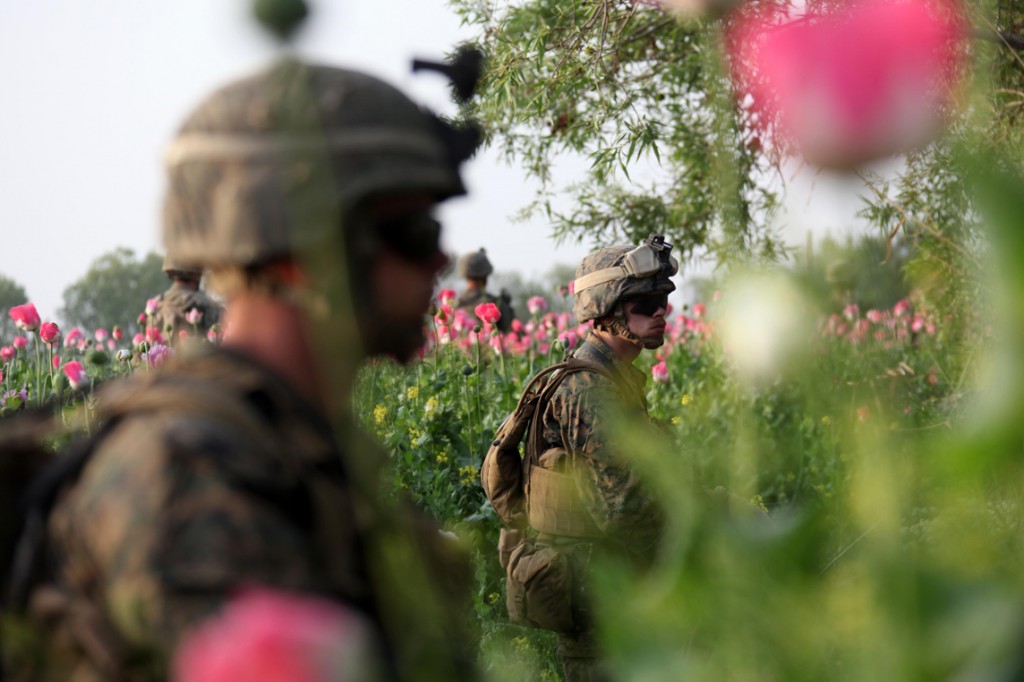
U.S. Marine Corps Lance Cpl. Mark Bower (right), a 60mm mortarman, and U.S. Marines with 1st Platoon, Company I, Battalion Landing Team 3/8, Regimental Combat Team 8, provide security for another element at the edge of a poppy field during a security patrol from their patrol base in Helmand province’s Green Zone, west of the Nahr-e Saraj canal, April 13, 2011. Elements of 26th Marine Expeditionary Unit deployed to Afghanistan to provide regional security in Helmand province in support of the International Security Assistance Force.
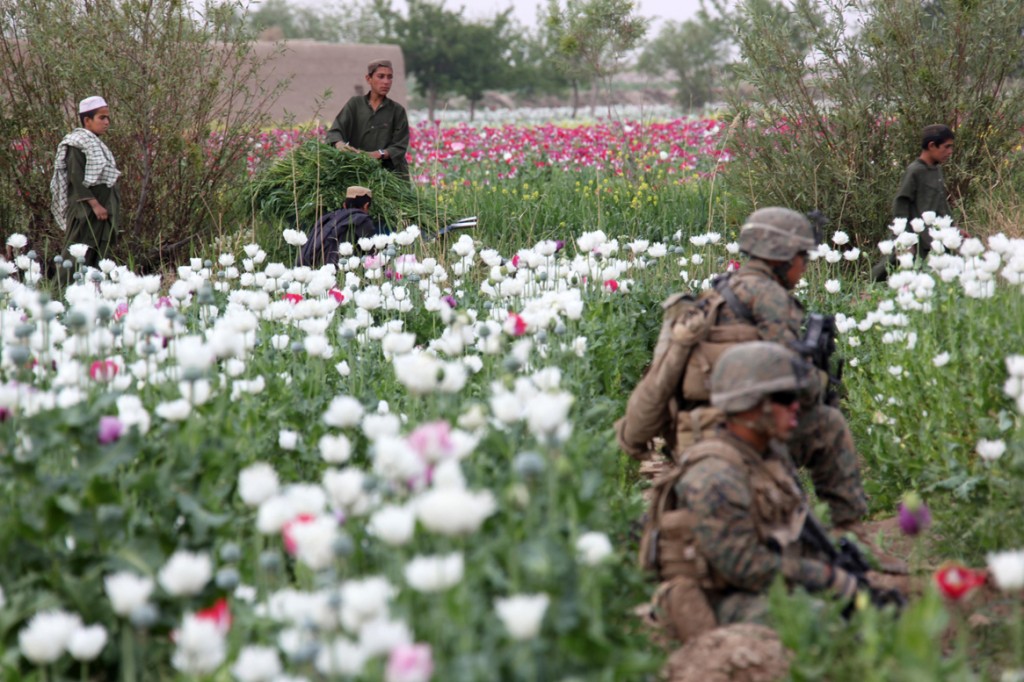
U.S. Marines Lance Cpl. Zachary Mizasawa, top, an M249 squad automatic weapon gunner, and Lance Cpl. Kevin Gonzalezsierra, a rifleman, both with 1st Platoon, Company I, Battalion Landing Team 3/8, Regimental Combat Team 8, hold in place while a group of Afghan boys tend poppy crops during a security patrol from their patrol base in Helmand province’s Green Zone, west of the Nahr-e Saraj canal, April 7, 2011. Elements of 26th Marine Expeditionary Unit deployed to Afghanistan to provide regional security in Helmand province in support of the International Security Assistance Force.
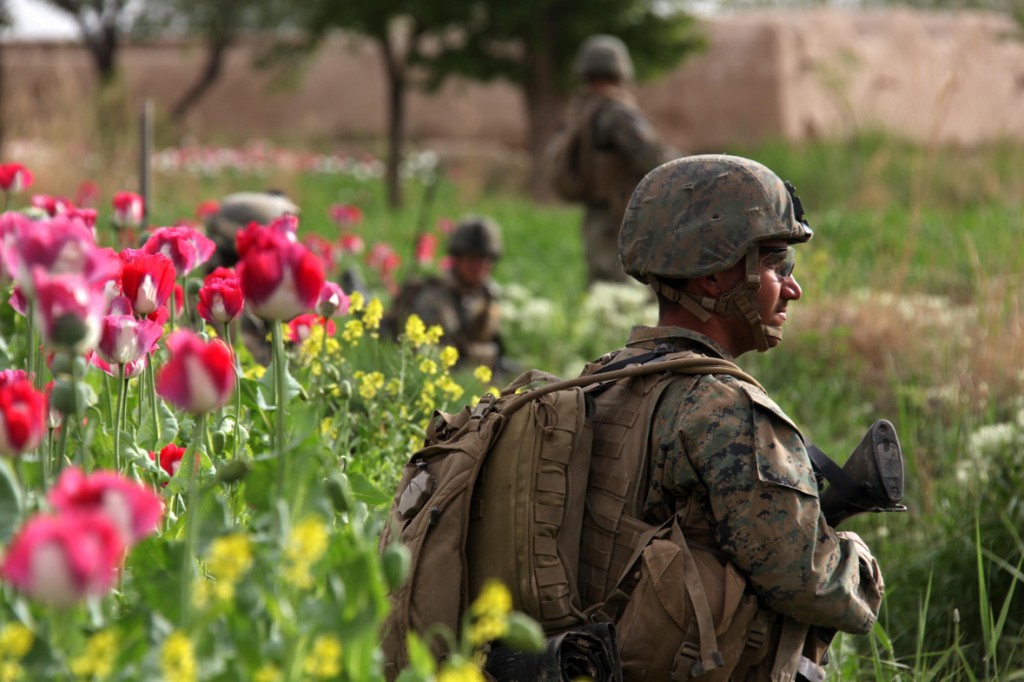
U.S. Navy Seaman Jeremy Threatte, a corpsman , and U.S. Marines with 2nd Platoon, Company I, Battalion Landing Team 3/8, Regimental Combat Team 8, pause at the edge of a poppy field during a security patrol from their patrol base in Helmand province’s Green Zone, west of the Nahr-e Saraj canal, April 5, 2011. Elements of 26th Marine Expeditionary Unit deployed to Afghanistan to provide regional security in Helmand province in support of the International Security Assistance Force.
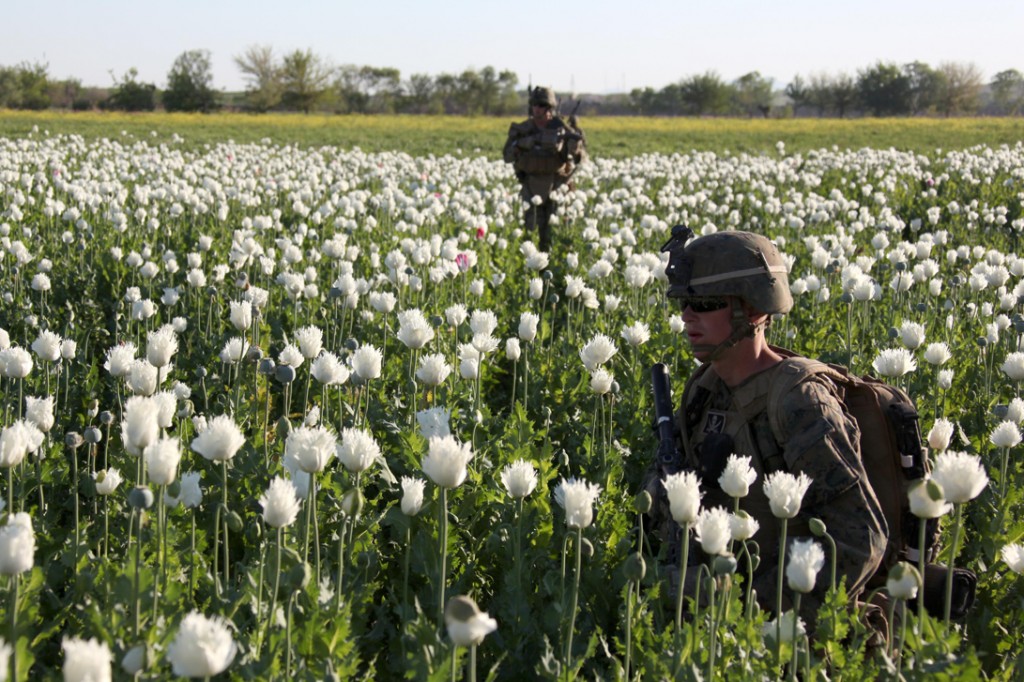
U.S. Navy Hospitalman Chris Coughlin, a corpsman with 1st Platoon, Company I, Battalion Landing Team 3/8, Regimental Combat Team 8, pauses in a poppy field during a security patrol from their patrol base in Helmand province’s Green Zone, west of the Nar-e Saraj canal, April 1. Elements of 26th Marine Expeditionary Unit deployed to Afghanistan to provide regional security in Helmand province in support of the International Security Assistance Force.
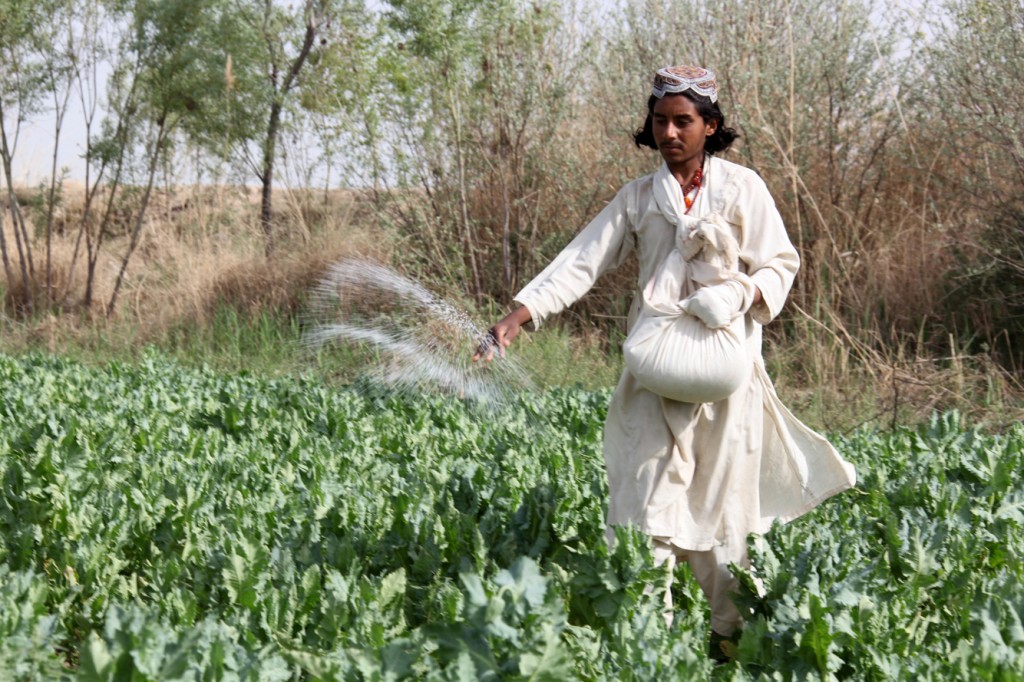
An Afghan farmer fertilizes his poppy field near the patrol base of U.S. Marine Corps Company I, Battalion Landing Team 3/8, Regimental Combat Team 8, in Helmand province’s Green Zone, west of the Nahr-e Saraj canal, March 27. Elements of 26th Marine Expeditionary Unit deployed to Afghanistan to provide regional security in Helmand province in support of the International Security Assistance Force.
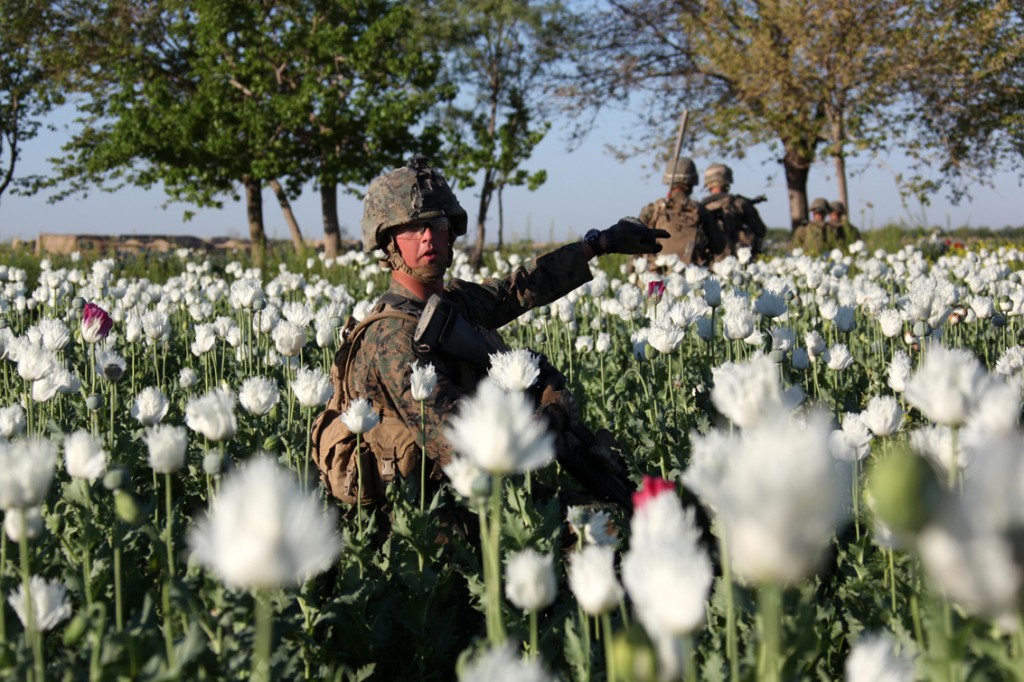
U.S. Marine Corps Lance Cpl. Timothy Brown, a team leader with 1st Platoon, Company I, Battalion Landing Team 3/8, Regimental Combat Team 8, passes word to his patrol members in a poppy field during a security patrol from their patrol base in Helmand province’s Green Zone, west of the Nar-e Saraj canal, April 1. Elements of 26th Marine Expeditionary Unit deployed to Afghanistan to provide regional security in Helmand province in support of the International Security Assistance Force.
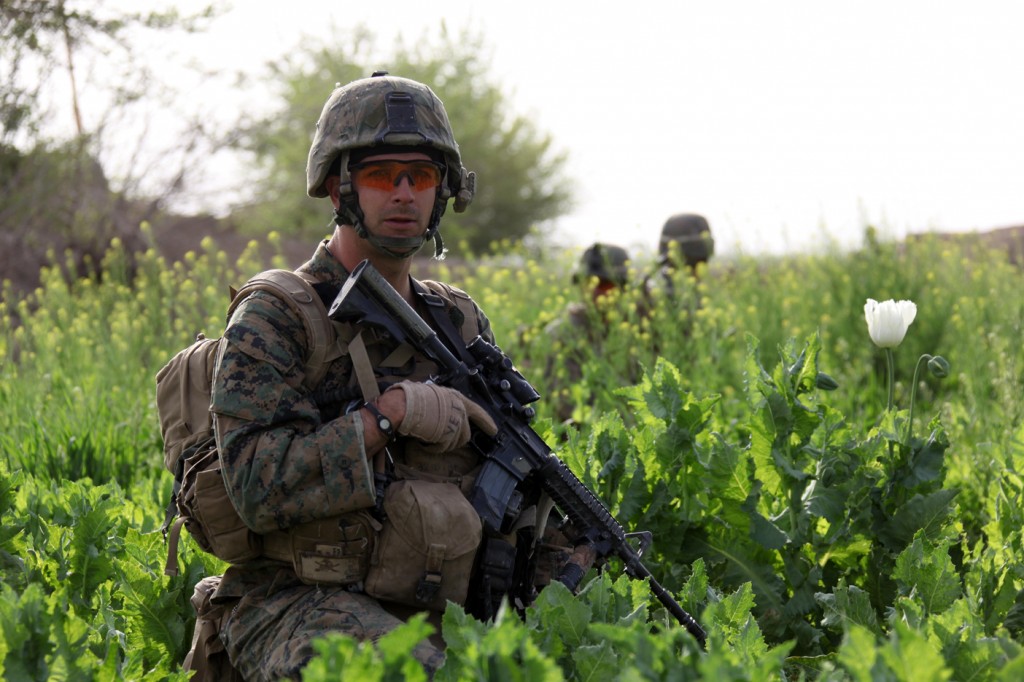
U.S. Navy Petty Officer 3rd Class Tyler Ivy, hospital corpsman, attached to 1st Platoon, Company I, Battalion Landing Team 3/8, Regimental Combat Team 8, pauses during a security patrol through a poppy field from their patrol base in Helmand province’s Green Zone, west of the Nahr-e Saraj canal, March 27. Elements of 26th Marine Expeditionary Unit deployed to Afghanistan to provide regional security in Helmand province in support of the International Security Assistance Force.
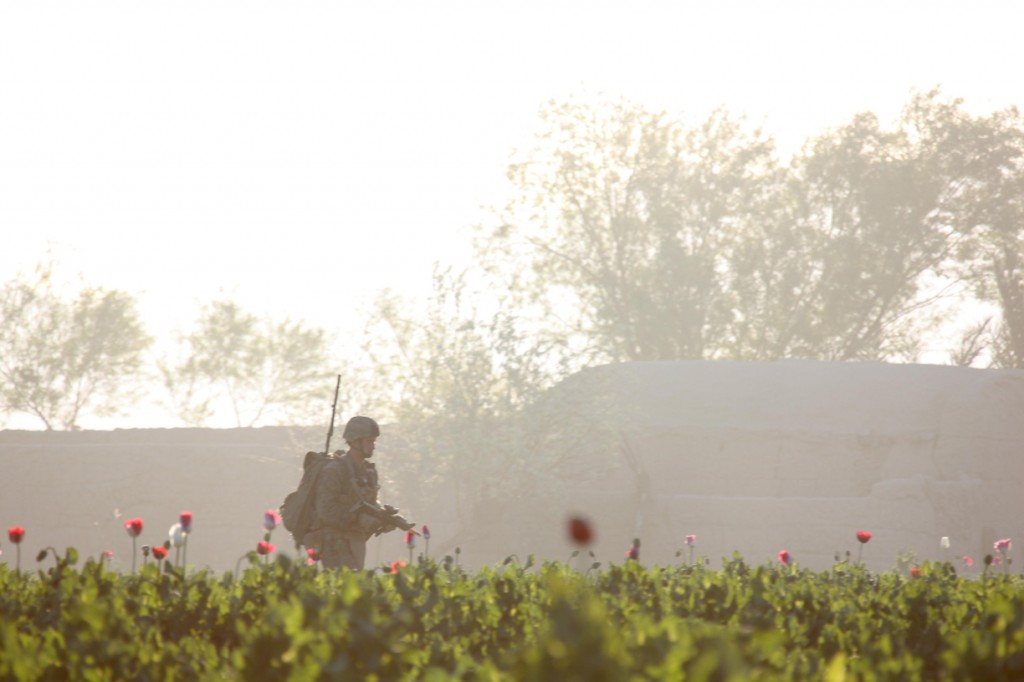
U.S. Marine Corps Lance Cpl. Clay Sherrod, an M249 squad automatic weapon gunner with Sniper Platoon attached to Company I, Battalion Landing Team 3/8, Regimental Combat Team 8, conducts a security patrol through a poppy field in the early morning haze from their patrol base in Helmand province’s Green Zone, west of the Nar-e Saraj canal, April 1. Elements of 26th Marine Expeditionary Unit deployed to Afghanistan to provide regional security in Helmand province in support of the International Security Assistance Force.
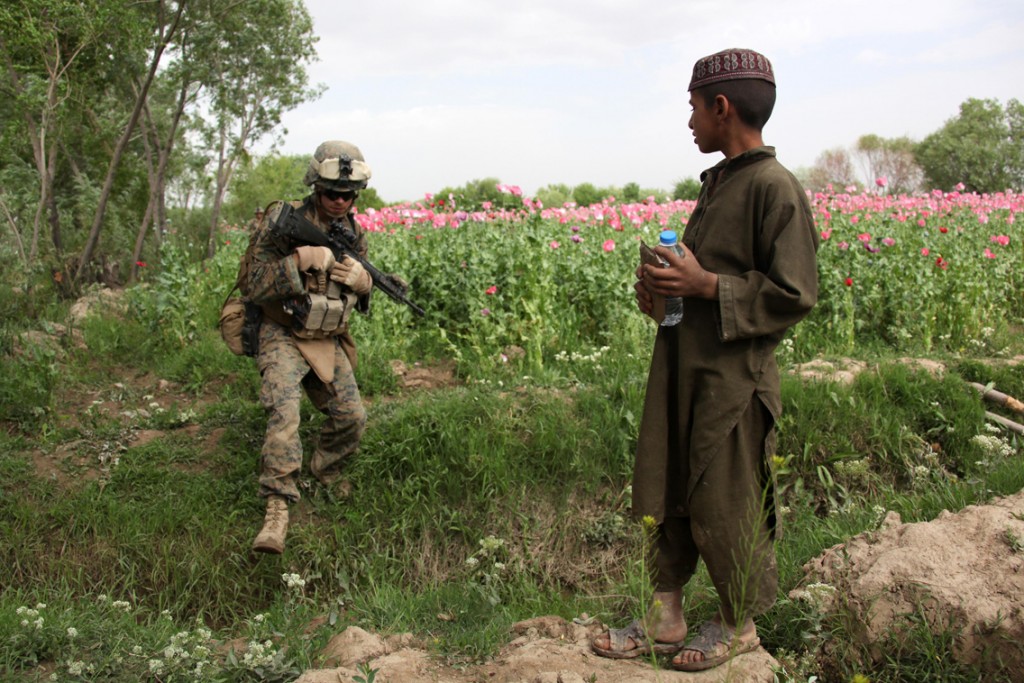
An Aghan boy working in a poppy field watches as U.S. Marine Corps Lance Cpl. Mark Bower, a 60mm mortarman with 1st Platoon, Company I, Battalion Landing Team 3/8, Regimental Combat Team 8, crosses a ditch during a security patrol from their patrol base in Helmand province’s Green Zone, west of the Nahr-e Saraj canal, April 13. Elements of 26th Marine Expeditionary Unit deployed to Afghanistan to provide regional security in Helmand province in support of the International Security Assistance Force.
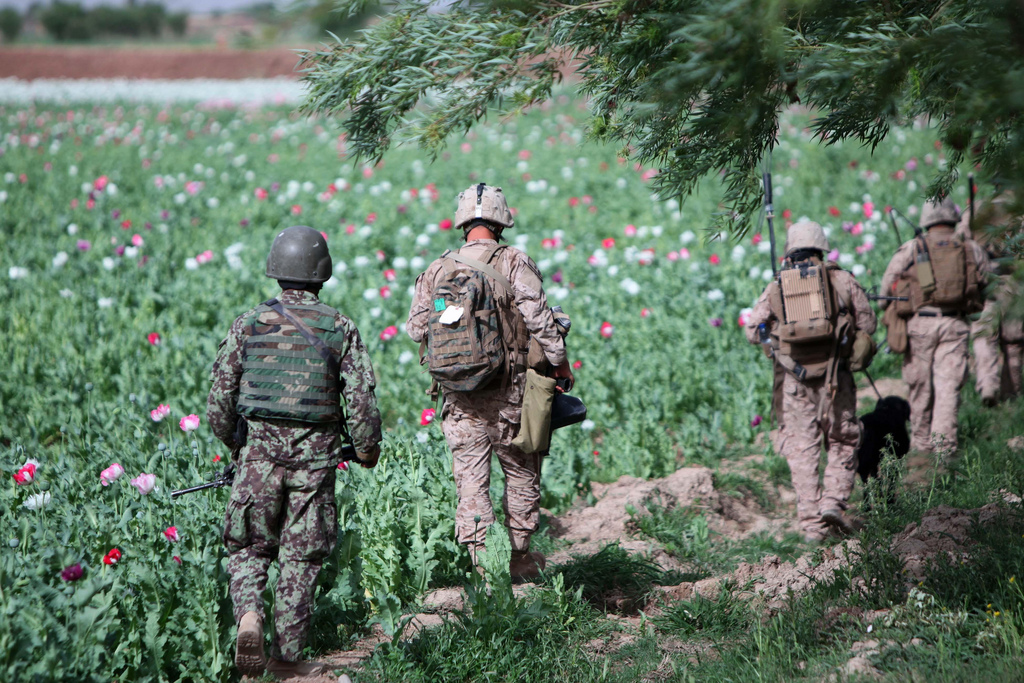
An Afghan National Army soldier accompanies a squad of Marines with Company B, 1st Tank Battalion, during a mission April 9. Tankers had to learn a whole new skill set in order to be successful during their seven-month tour in Afghanistan.
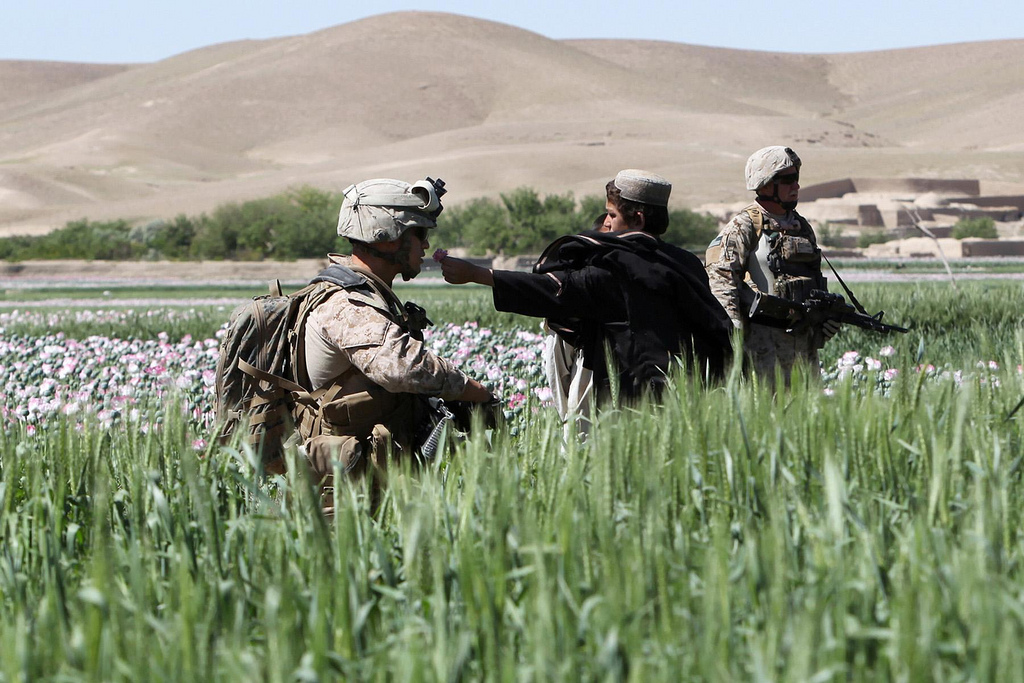
An Afghan child helps Cpl. Anthony J. Chavez, an Albuquerque, N.M., native, and a provisional rifleman with Bravo Battery, 1st Battalion, 10th Marines, Regimental Combat Team-8, stop to smell the flowers during a patrol halt in the Kajaki green zone, Helmand province, Afghanistan, April 19.
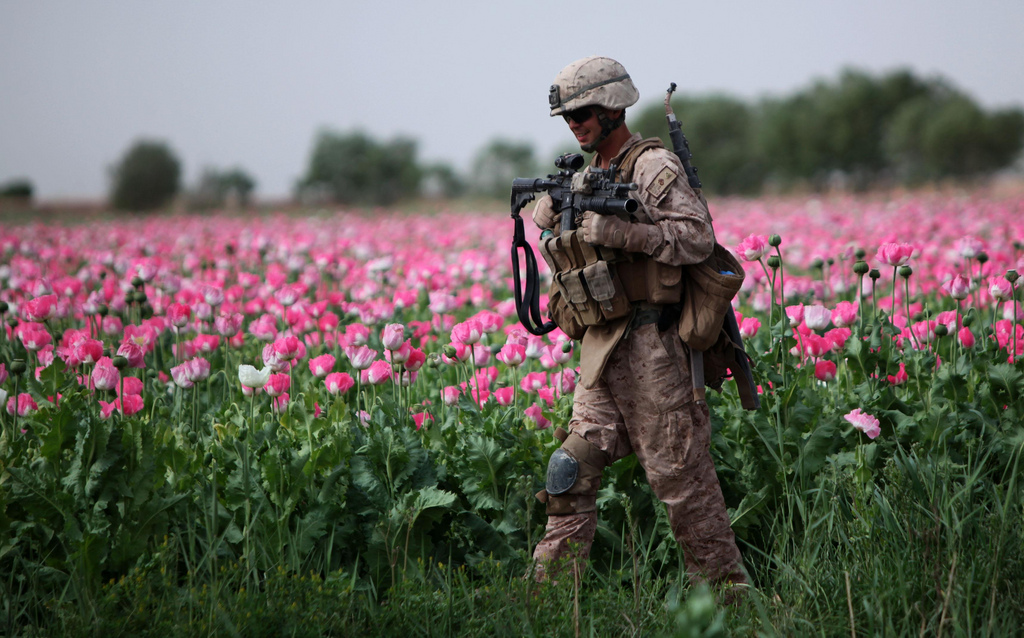
MARJAH, Helmand province, Islamic Republic of Afghanistan – Corporal Mark Hickok, a 23-year-old combat engineer from North Olmstead, Ohio, patrols through a field during a clearing mission April 9. Marines with Company B, 1st Tank Battalion, learned basic route clearance techniques from engineers like Hickok, who are deployed with 1st Combat Engineer Battalion.
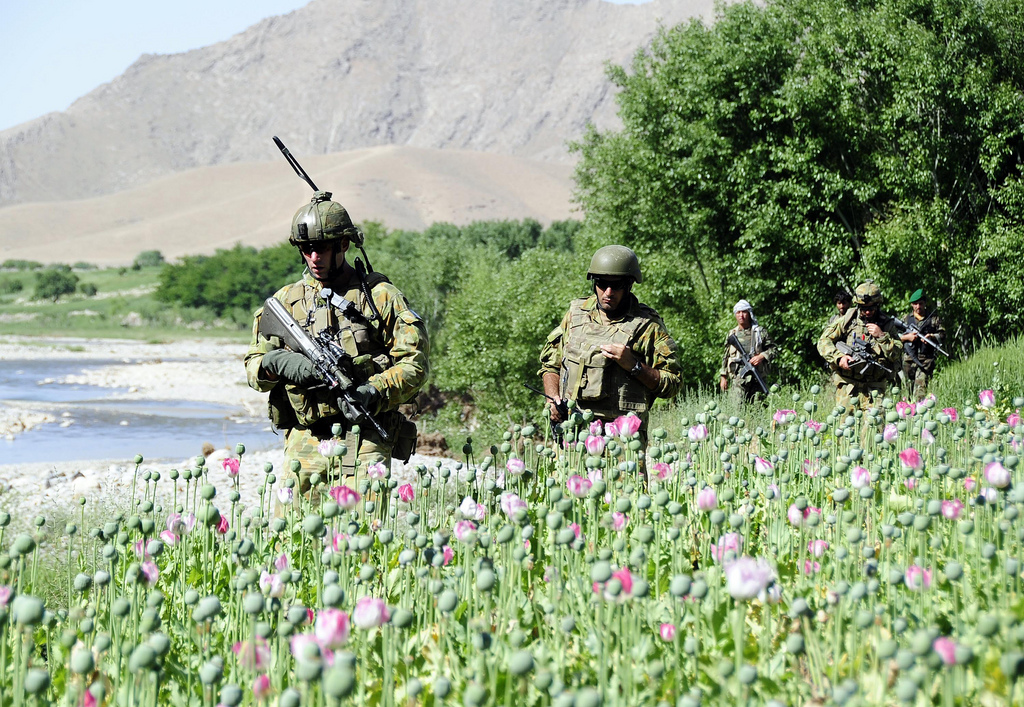
Captain Julian Hohnen, Officer Commanding a combined Australian and Afghan Army patrol base in the Baluchi Valley Region mentors Afghan National Army Officer, Lieutenant Farhad Habib. Mid Caption: All across the MTF1 area of operations partnered mentoring is being conducted on mounted and dismounted combined patrols with ever increasing security presence being experienced by local communities from the Southern Baluchi Valley to the Northern Chora reaches as well as east through the Mirabad. Ongoing combined ANA and MTF1 security operations involving infantry, combat engineer and reconnaissance capabilities in Oruzgan have achieved multiple layers of effects including an increased rate of IED “find and render safe” percentages, increased cache finds, and enhanced trust fostered within local communities. Deep Caption: Operation SLIPPER is Australia’s military contribution to the international campaign against terrorism, piracy and improving maritime security. Under this operation our forces contribute to the efforts of the North Atlantic Treaty Organisation (NATO) – led International Security Assistance Force (ISAF) in Afghanistan. ISAF seeks to bring security, stability and prosperity to Afghanistan and aims to prevent Afghanistan again becoming a safe haven for international terrorists. Operation SLIPPER also supports the United States led International Coalition Against Terrorism (ICAT) in the broader Middle East.
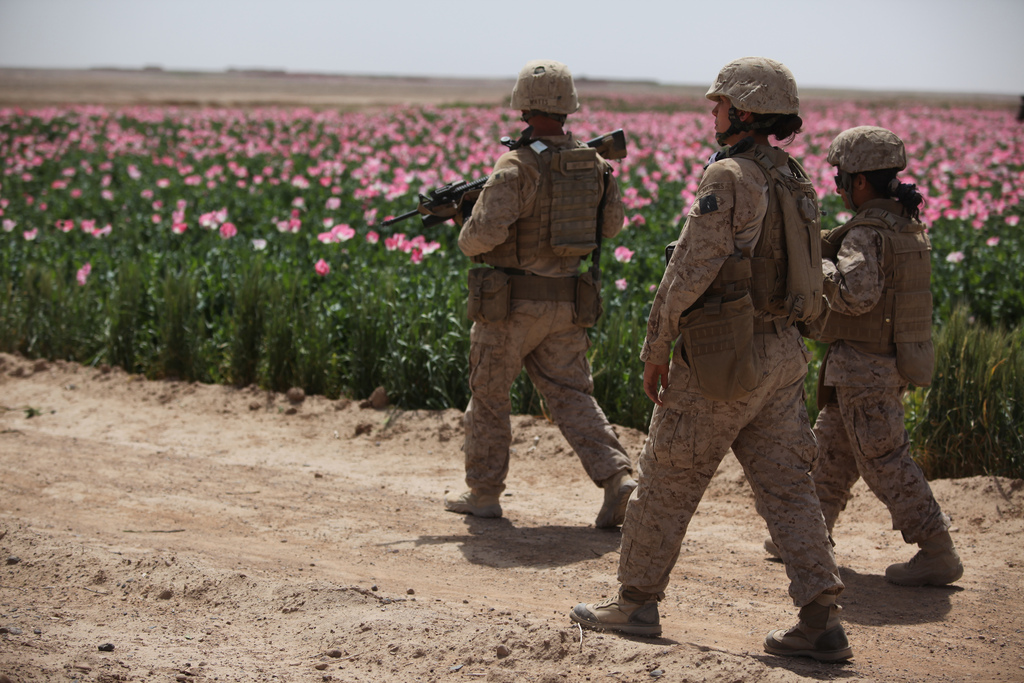
U.S. Marines assigned to the female engagement team (FET) of I Marine Expeditionary Force (Forward) conduct a patrol alongside a poppy field while visiting Afghan settlements in Boldak, Afghanistan, April 5, 2010. The FET, which is deployed in support of the International Security Assistance Force, is in the area to engage with local women in an effort to gain cultural awareness and ascertain family needs. (DoD photo by Cpl. Lindsay L. Sayres, U.S. Marine Corps/Released)
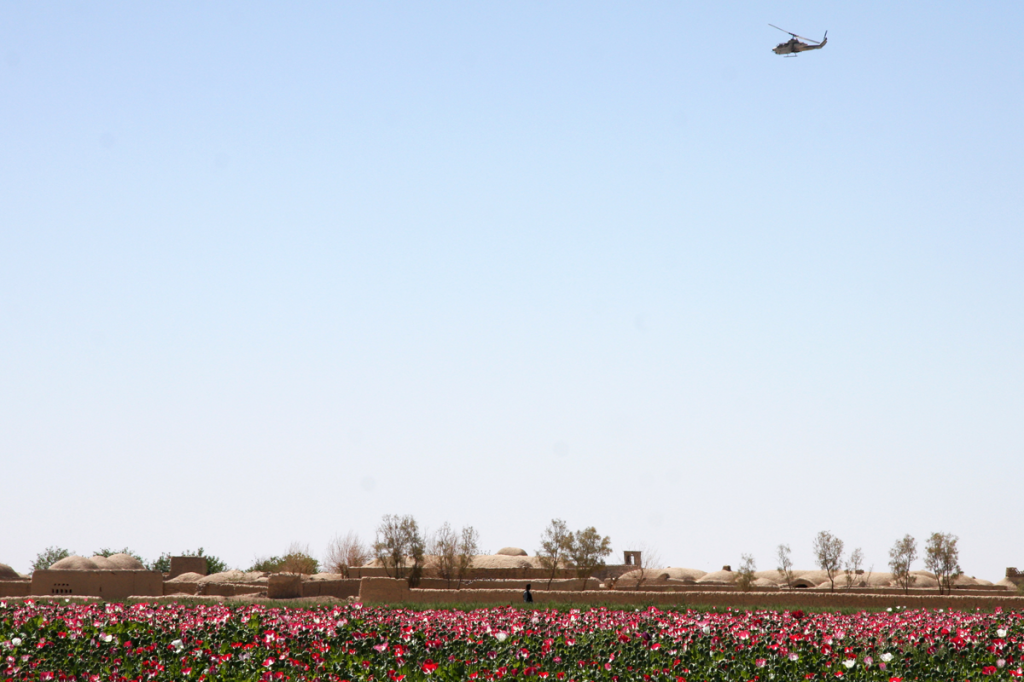
An Afghan poppy farmer watches an AH-1W Cobra helicopter fly over his field in Farah province, Afghanistan, March 8, 2009. The Cobras are providing overwatch protection for Afghan National Police officers and U.S. Marines with India Company, 3rd Battalion, 8th Marine Regiment as they conduct a cordon and search in a small village. The Cobras are part of the Air Command Element for the Special Purpose Marine Air Ground Task Force-Afghanistan which is rooting out Taliban and insurgent fighters and providing security for the Afghan people. (U.S. Marine Corps photo by Chief Warrant Offficer Philippe Chasse/Released)
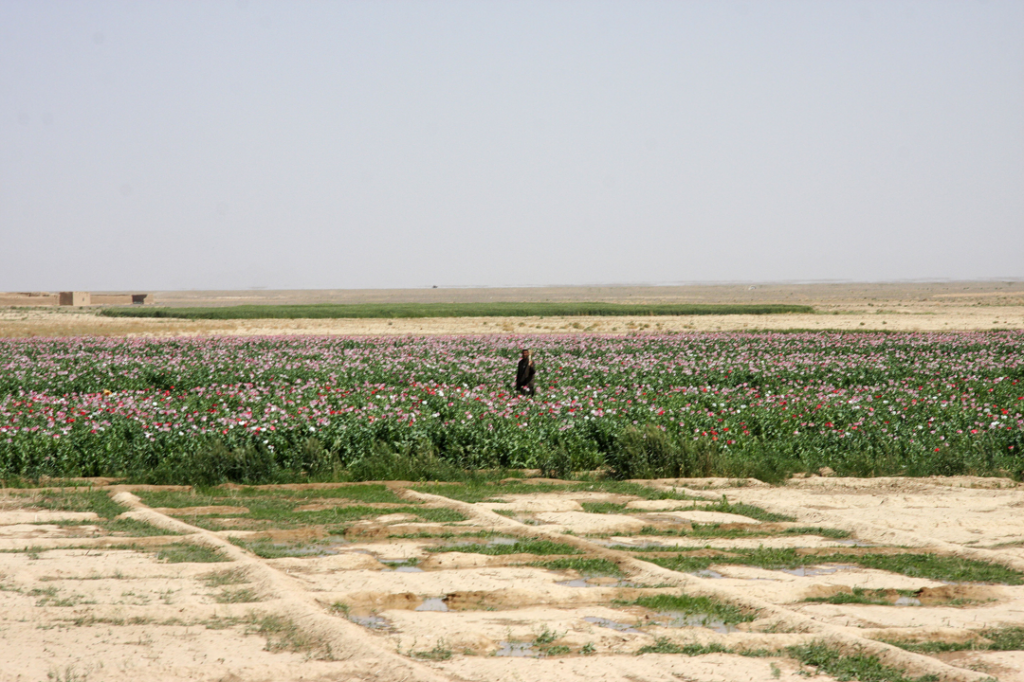
An Afghani farmer stands in the middle of his poppy field in Delaram, Afghanistan, watching U.S. Marines from 3rd Battalion, 8th Marine Regiment Combat Train conduct a resupply convoy down Highway 515, from Delaram to Bakwa, Afghanistan, March 25, 2009. The Iraqi government is working to eradicate poppy cultivation throughout the country to improve the health, security and development of Afghanistan. Alternative livelihoods for farmers are being planned and implemented. (U.S. Marine Corps photo by Chief Warrant Officer Philippe Chasse/Released)
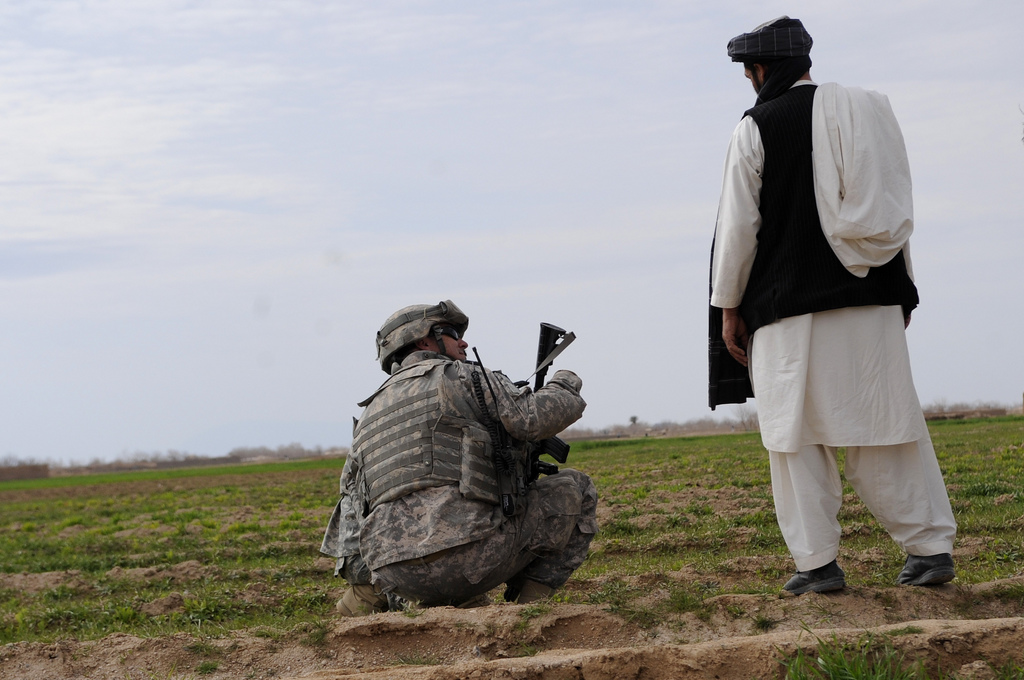
DIZAK, Afghanistan – ARSIC-W’s Commander’s Emergency Response Program Manager U.S. Navy Lieutenant David Williams from San Diego, Calif., checks out a villager’s poppy crop after being informed the profit for poppy was 40% greater than the profit for growing wheat in the area. Williams visited Dizak to gather information on their needs the same day the Afghan National Police and ARSIC-W Civil Affairs Team delivered humanitarian aid to the village. He plans to use CERP funds to assist the villagers in the future. ISAF Photo by US Navy Mass Communications Specialist Petty Officer 1st Class Monica R. Nelson
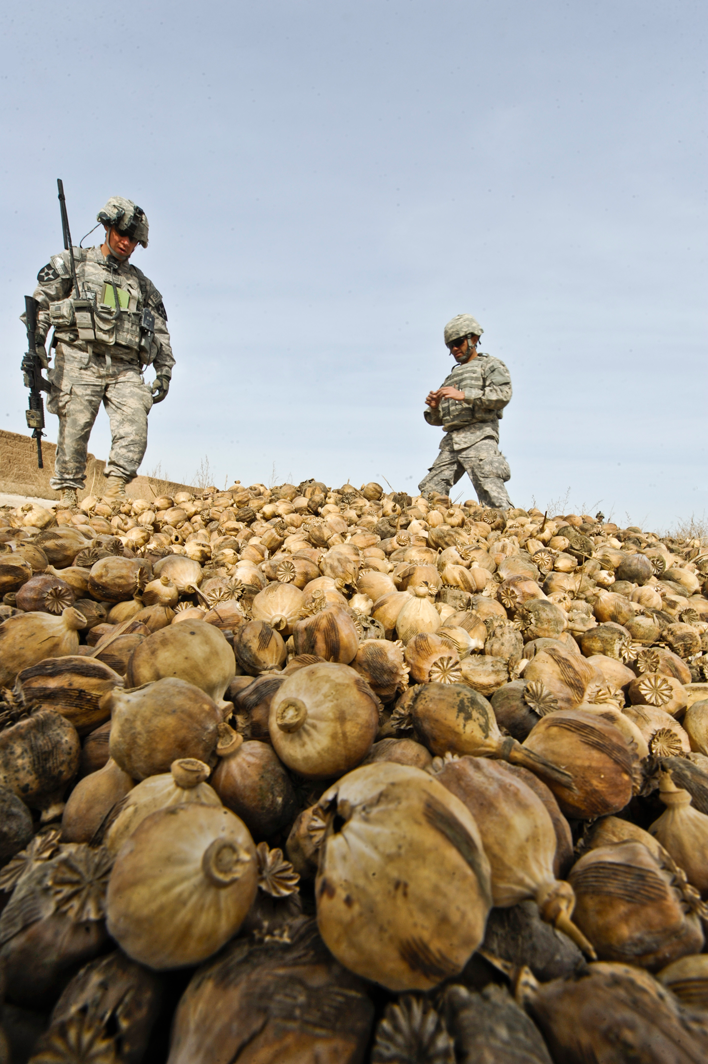
U.S. Army Lt. Col. Burton Shields, commander of 4th Battalion, 23rd Infantry Regiment, and his interpreter Ali Mohamed discover a pile of dried poppy plants in Badula Qulp, Helmand province, Afghanistan, Feb. 12, 2010. The Soldiers are participating in Operation Helmand Spider. (U.S. Air Force photo by Tech. Sgt. Efren Lopez/Released)
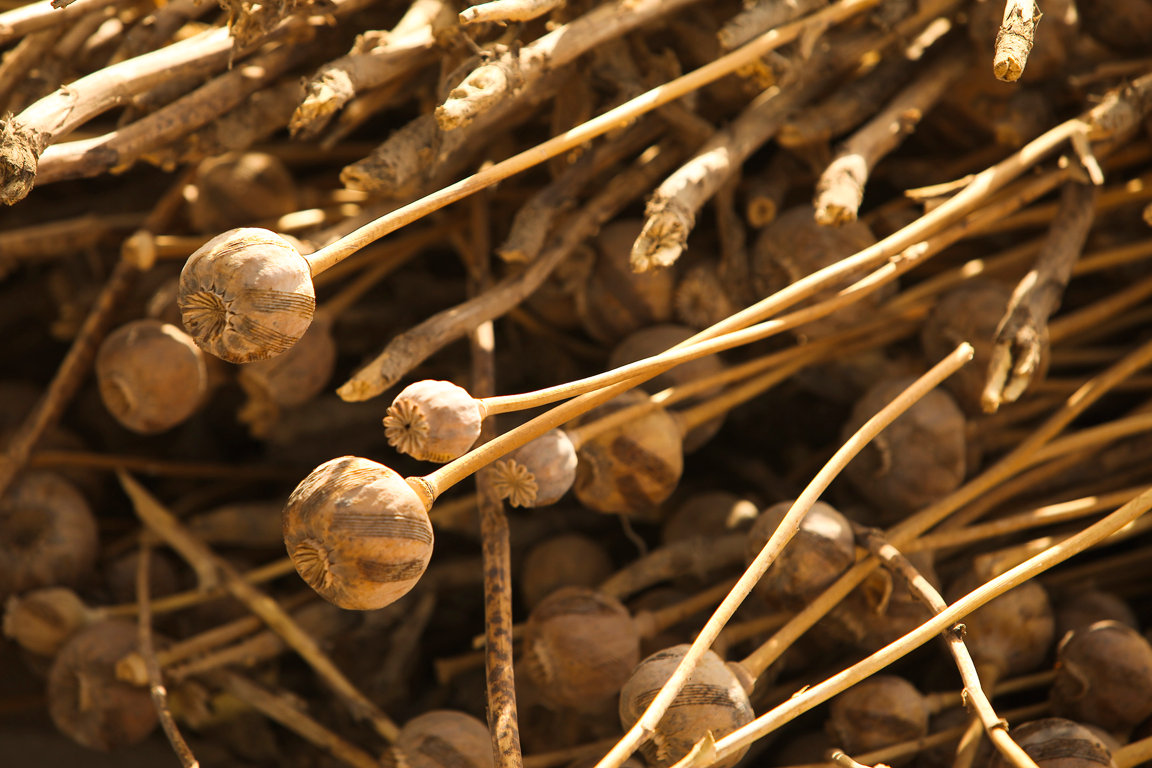
Dried Poppy plants are photographed July 15, 2009, as Afghan National Army soldiers and U.S. Marines with 1st Battalion, 5th Marine Regiment conduct a civil affairs patrol in the Nawa District, Helmand Province, Afghanistan. Marines with 1st Battalion, 5th Marine Regiment, Regimental Combat Team 3, 2nd Marine Expeditionary Brigade – Afghanistan, are deployed in support of NATO’s International Security Assistance Force. (U.S. Marine Corps photo by Lance Cpl. James Purschwitz/Released)
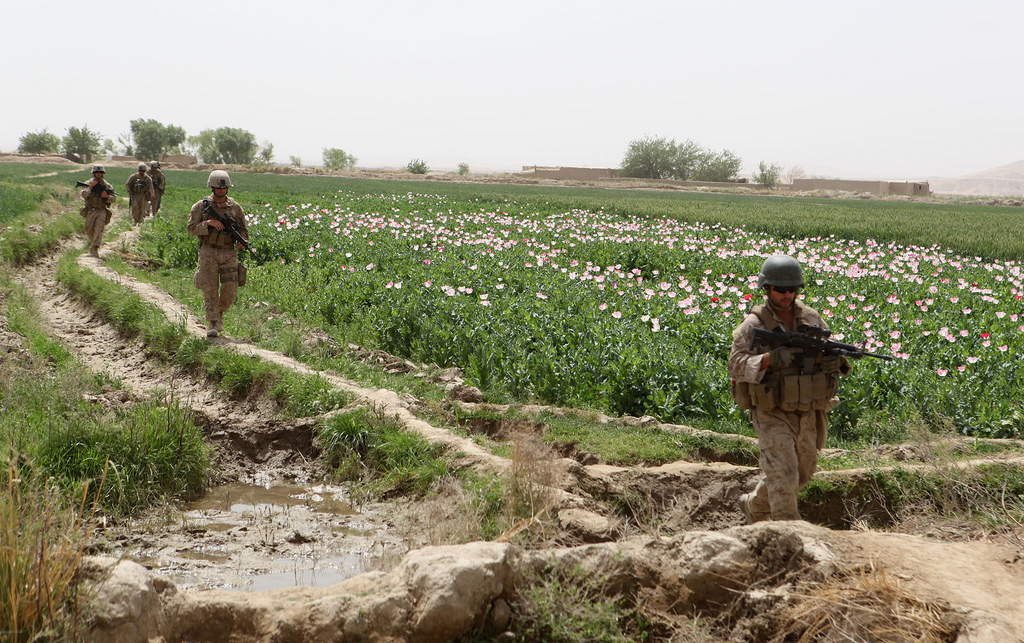
A Police Mentoring Team and members of the Afghan national police patrol through a poppy field near Combat Outpost Castle, Helmand province, Afghanistan, March 29. PMT routinely patrol the area searching for improvised explosive devises, looking for Taliban influence, and interacting with the local populace while mentoring the ANP.
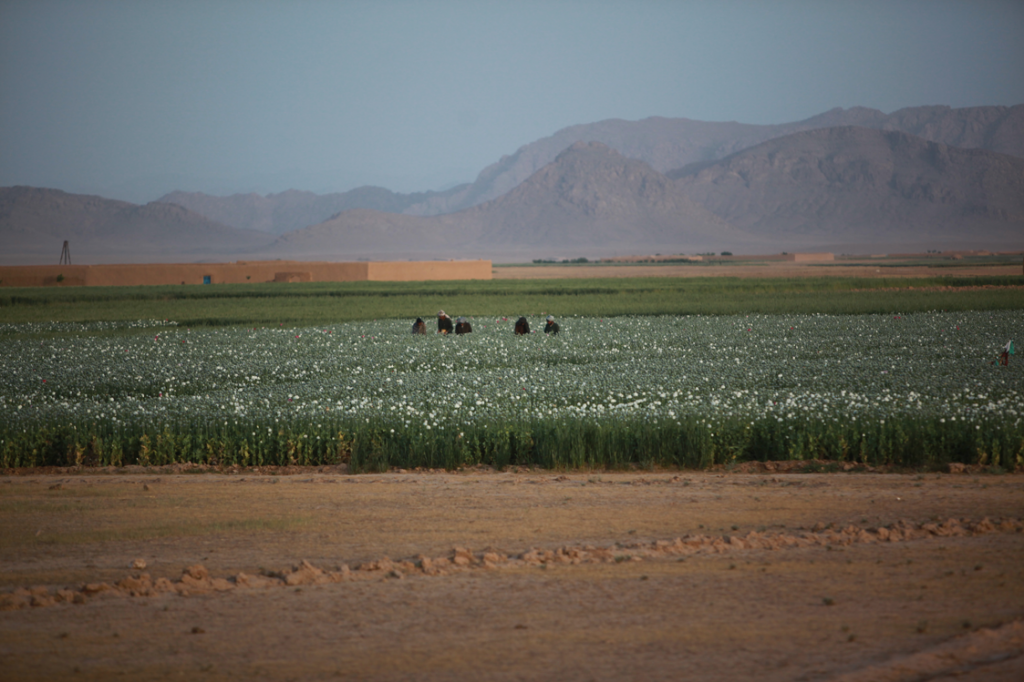
Afghan farmers grow poppies outside the Salaam Bazaar in Now Zad, Afghanistan, April 14, 2010. (U.S. Marine Corps photo by Lance Cpl. Matthew P. Troyer/Released)
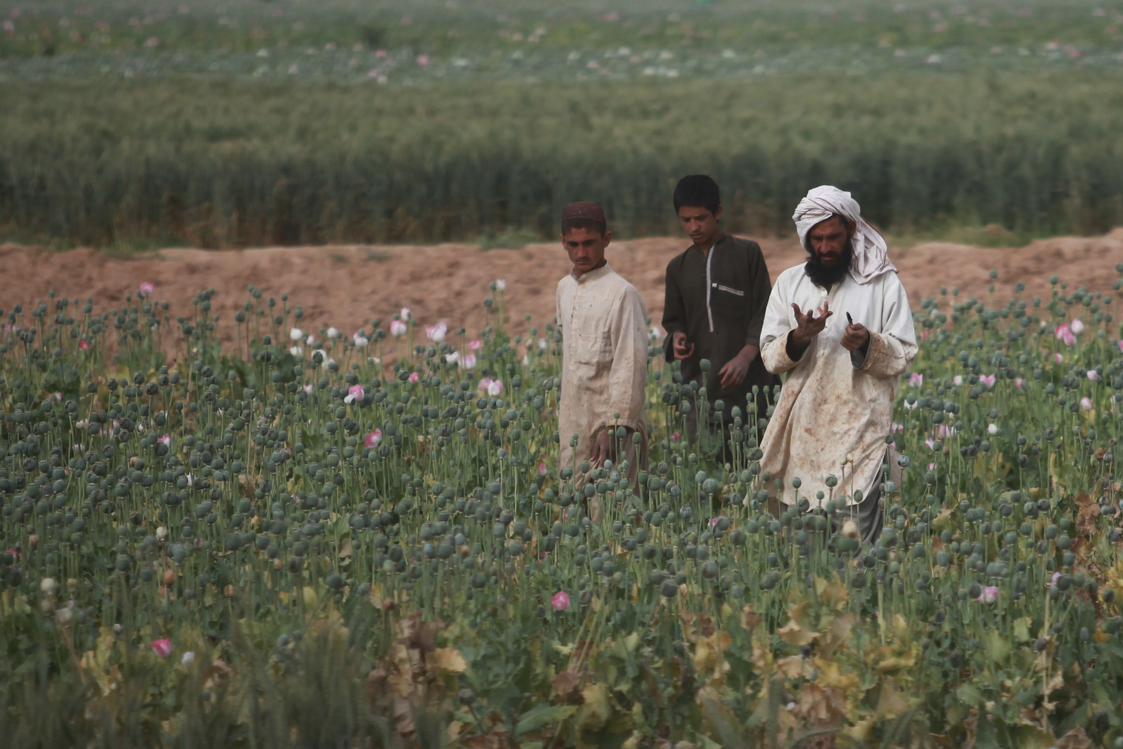
Afghan farmers walk the fields and check their poppy plants as poppy season nears in Now Zad, Afghanistan, April 14, 2010. (U.S. Marine Corps photo by Lance Cpl. Matthew P. Troyer/Released)
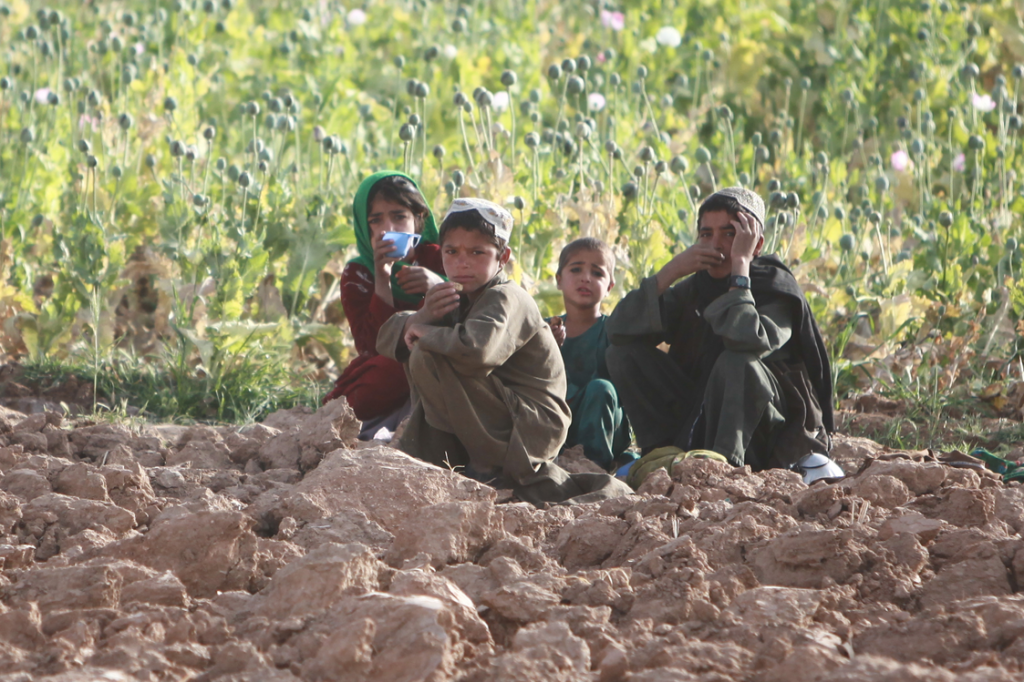
Afghan children sit outside a poppy field in Now Zad, Afghanistan, April 14, 2010. The children played together while older family members worked the poppy fields. (U.S. Marine Corps Photo by Lance Cpl. Matthew P. Troyer/Released)
http://asheepnomore.net/2014/03/26/u...um-production/If you're gonna fight, fight like you're the third monkey on the ramp to Noah's Ark... and brother its starting to rain. Join our efforts to Secure America's Borders and End Illegal Immigration by Joining ALIPAC's E-Mail Alerts network (CLICK HERE)
-
04-04-2022, 02:31 PM #39
If they can grow poppies, they can grow their own food!
No more money, no aid, no oatmeal and NO refugees coming here.
Send them all back home to make their own country great.ILLEGAL ALIENS HAVE "BROKEN" OUR IMMIGRATION SYSTEM
DO NOT REWARD THEM - DEPORT THEM ALL
-
08-13-2023, 03:19 AM #40
Taliban’s Massively Successful Opium Eradication Raises Questions About What US Was Doing All Along
SATURDAY, AUG 12, 2023 - 11:30 PM
Authored by Alan MacLeod via MintPress News,
The Taliban government in Afghanistan – the nation that until recently produced 90% of the world’s heroin – has drastically reduced opium cultivation across the country. Western sources estimate an up to 99% reduction in some provinces. This raises serious questions about the seriousness of U.S. drug eradication efforts in the country over the past 20 years. And, as global heroin supplies dry up, experts tell MintPress News that they fear this could spark the growing use of fentanyl – a drug dozens of times stronger than heroin that already kills more than 100,000 Americans yearly.
The Taliban Does What the US Did Not
It has already been called “the most successful counter-narcotics effort in human history.” Armed with little more than sticks, teams of counter-narcotics brigades travel the country, cutting down Afghanistan’s poppy fields.
In April of last year, the ruling Taliban government announced the prohibition of poppy farming, citing both their strong religious beliefs and the extremely harmful social costs that heroin and other opioids – derived from the sap of the poppy plant – have wrought across Afghanistan.
It has not been all bluster. New research from geospatial data company Alcis suggests that poppy production has already plummeted by around 80% since last year. Indeed, satellite imagery shows that in Helmand Province, the area that produces more than half of the crop, poppy production has dropped by a staggering 99%. Just 12 months ago, poppy fields were dominant. But Alcis estimates that there are now less than 1,000 hectares of poppy growing in Helmand.
Instead, farmers are planting wheat, helping stave off the worst of a famine that U.S. sanctions helped create. Afghanistan is still in a perilous state, however, with the United Nations warning that six million people are close to starvation.
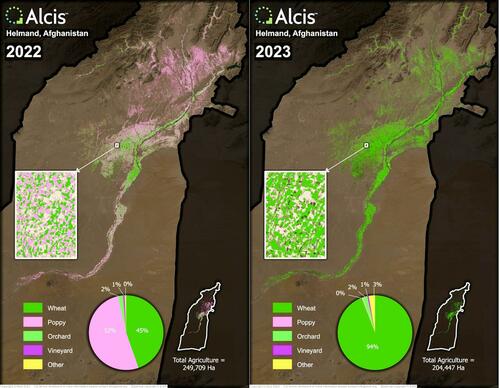 Data from Alcis shows that a majority of Afghan farmers switched from growing poppy to wheat in a single yearThe Taliban waited until 2022 to impose the long-awaited ban in order not to interfere with the growing season. Doing so would have provoked unrest among the rural population by eradicating a crop that farmers had spent months growing. Between 2020 and late 2022, the price of opium in local markets rose by as much as 700%. Yet given the Taliban’s insistence – and their efficiency at eradication – few have been tempted to plant poppies.
Data from Alcis shows that a majority of Afghan farmers switched from growing poppy to wheat in a single yearThe Taliban waited until 2022 to impose the long-awaited ban in order not to interfere with the growing season. Doing so would have provoked unrest among the rural population by eradicating a crop that farmers had spent months growing. Between 2020 and late 2022, the price of opium in local markets rose by as much as 700%. Yet given the Taliban’s insistence – and their efficiency at eradication – few have been tempted to plant poppies.
The poppy ban has been matched by a similar campaign against the methamphetamine industry, with the government targeting the ephedra crop and shutting down ephedrine labs across the country.
A Looming Catastrophe
Afghanistan produces almost 90% of the world’s heroin. Therefore, the eradication of the opium crop will have profound worldwide consequences on drug use. Experts MintPress spoke to warned that a dearth of heroin would likely produce a huge spike in the use of synthetic opioids such as fentanyl, a drug the Center for Disease Control estimates is 50 times stronger and is responsible for taking the lives of more than 100,000 Americans each year.
“It is important to consider past periods of heroin shortages and the impact these have had on the European drug market,” the European Monitoring Center for Drugs and Drug Addiction (EMCDDA) told MintPress, adding:Experience in the E.U. with previous periods of reduced heroin supply suggests that this can lead to changes in patterns of drug supply and use. This can include further an increase in rates of polysubstance use among heroin users. Additional risks to existing users may be posed by the substitution of heroin with more harmful synthetic opioids, including fentanyl and its derivatives and new potent benzimidazole opioids.”In other words, if heroin is no longer available, users will switch to far deadlier synthetic forms of the drug. A 2022 United Nations report came to a similar conclusion, noting that the crackdown on heroin production could lead to the “replacement of heroin or opium by other substances…such as fentanyl and its analogs.”
“It does have that danger in the macro sense, that if you take all that heroin off the market, people are going to go to other products,” Matthew Hoh told MintPress. Hoh is a former State Department official who resigned from his post in Zabul Province, Afghanistan, in 2009. “But the response should not be reinvade Afghanistan, reoccupy it and put the drug lords back in power, which is basically what people are implying when they bemoan the consequence of the Taliban stopping the drug trade,” Hoh added; “Most of the people who are speaking this way and worrying out loud about it are people who want to find a reason for the U.S. to go and affect regime change in Afghanistan.”
There certainly has been plenty of hand-wringing from American sources. “Foreign Policy,” wrote about “how the Taliban’s ‘war on drugs’ could backfire;” U.S. government-funded “Radio Free Europe/Radio Liberty” claimed that the Taliban were turning a “blind eye to opium production,” despite the official ban. And the United States Institute of Peace, an institution created by Congress that is “dedicated to the proposition that a world without violent conflict is possible,” stated emphatically that “the Taliban’s successful opium ban is bad for Afghans and the world”.
This looming catastrophe, however, will not hit immediately. Significant stockpiles of drugs along trafficking routes still exist. As the EMCDDA told MintPress:It can take over 12 months before the opium harvest appears on the European retail drug market as heroin – and so it is too early to predict, at this stage, the future impact of the cultivation ban on heroin availability in Europe. Nonetheless, if the ban on opium cultivation is enforced and sustained, it could have a significant impact on heroin availability in Europe during 2024 or 2025.”Yet there is little indication that the Taliban are anything but serious about eradicating the crop, indicating that a heroin crunch is indeed coming.
A similar attempt by the Taliban to eliminate the drug occurred in 2000, the last full year that they were in power. It was extraordinarily successful, with opium reduction dropping from 4,600 tons to just 185 tons. At that time, it took around 18 months for the consequences to be felt in the West. In the United Kingdom, average heroin purity fell from 55% to 34%, while in the Baltic States of Estonia, Latvia and Lithuania, heroin was largely replaced by fentanyl. However, as soon as the United States invaded in 2001, poppy cultivation shot back up to previous levels and the supply chain recommenced.
US Complicity in the Afghan Drug Trade
The Taliban’s successful campaign to eradicate drug production has cast a shadow of doubt over the effectiveness of American-led endeavors to achieve the same outcome. “It prompts the question, ‘What were we actually accomplishing there?!'” remarked Hoh, underscoring:This undermines one of the fundamental premises behind the wars: the alleged association between the Taliban and the drug trade – a concept of a narco-terror nexus. However, this notion was fallacious. The reality was that Afghanistan was responsible for a staggering 80-90% of the world’s illicit opiate supply. The primary controllers of this trade were the Afghan government and military, entities we upheld in power.”Hoh clarified that he never personally witnessed or received any reports of direct involvement by U.S. troops or officials in narcotics trafficking. Instead, he contended that there existed a “conscious and deliberate turning away from the unfolding events” during his tenure in Afghanistan.’
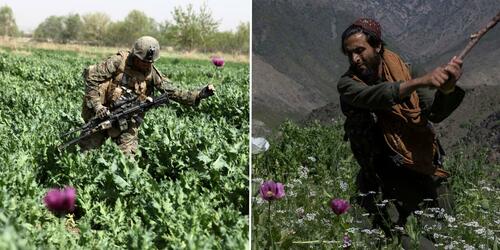 Left, a US Marine picks a flower as he guards a poppy field in 2012 in Helmand Provine. Photo | DVIDS. Right, A man breaks poppy stalks as part of a 2023 campaign to target illegal drugs in Afghanistan. Oriane Zerah | APSuzanna Reiss, an academic at the University of Hawaii at Manoa and the author of “We Sell Drugs: The Alchemy of U.S. Empire,” demonstrated an even more cynical perspective on American counter-narcotics endeavors as she conveyed to MintPress:The U.S. has never really been focused on reducing the drug trade in Afghanistan (or elsewhere for that matter). All the lofty rhetoric aside, the U.S. has been happy to work with drug traffickers if the move would advance certain geopolitical interests (and indeed, did so, or at least turned a knowingly blind eye, when groups like the Northern Alliance relied on drugs to fund their political movement against the regime.).”Afghanistan’s transformation into a preeminent narco-state owes a significant debt to Washington’s actions. Poppy cultivation in the 1970s was relatively limited. However, the tide changed in 1979 with the inception of Operation Cyclone, a massive infusion of funds to Afghan Mujahideen factions aimed at exhausting the Soviet military and terminating its presence in Afghanistan. The U.S. directed billions toward the insurgents, yet their financial needs persisted. Consequently, the Mujahideen delved into the illicit drug trade. By the culmination of Operation Cyclone, Afghanistan’s opium production had soared twentyfold. Professor Alfred McCoy, acclaimed author of “The Politics of Heroin: CIA Complicity in the Global Drug Trade,” shared with MintPress that approximately 75% of the planet’s illegal opium output was now sourced from Afghanistan, a substantial portion of the proceeds funneling to U.S.-backed rebel factions.
Left, a US Marine picks a flower as he guards a poppy field in 2012 in Helmand Provine. Photo | DVIDS. Right, A man breaks poppy stalks as part of a 2023 campaign to target illegal drugs in Afghanistan. Oriane Zerah | APSuzanna Reiss, an academic at the University of Hawaii at Manoa and the author of “We Sell Drugs: The Alchemy of U.S. Empire,” demonstrated an even more cynical perspective on American counter-narcotics endeavors as she conveyed to MintPress:The U.S. has never really been focused on reducing the drug trade in Afghanistan (or elsewhere for that matter). All the lofty rhetoric aside, the U.S. has been happy to work with drug traffickers if the move would advance certain geopolitical interests (and indeed, did so, or at least turned a knowingly blind eye, when groups like the Northern Alliance relied on drugs to fund their political movement against the regime.).”Afghanistan’s transformation into a preeminent narco-state owes a significant debt to Washington’s actions. Poppy cultivation in the 1970s was relatively limited. However, the tide changed in 1979 with the inception of Operation Cyclone, a massive infusion of funds to Afghan Mujahideen factions aimed at exhausting the Soviet military and terminating its presence in Afghanistan. The U.S. directed billions toward the insurgents, yet their financial needs persisted. Consequently, the Mujahideen delved into the illicit drug trade. By the culmination of Operation Cyclone, Afghanistan’s opium production had soared twentyfold. Professor Alfred McCoy, acclaimed author of “The Politics of Heroin: CIA Complicity in the Global Drug Trade,” shared with MintPress that approximately 75% of the planet’s illegal opium output was now sourced from Afghanistan, a substantial portion of the proceeds funneling to U.S.-backed rebel factions.
Unraveling the Opioid Crisis: An Impending Disaster
The opioid crisis is the worst addiction epidemic in U.S. history. Earlier this year, Department of Homeland Security Secretary Alejandro Mayorkas described the American fentanyl problem as “the single greatest challenge we face as a country.” Nearly 110,000 Americans died from drug overdoses in 2021, fentanyl being by far the leading cause. Between 2015 and 2021, the National Institute of Health recorded a nearly 7.5-fold increase in overdose deaths. Medical journal The Lancet predicts that 1.2 million Americans will die from opioid overdoses by 2029.
U.S. officials blame Mexican cartels for smuggling the synthetic painkiller across the southern border and China for producing the chemicals necessary to make the drug.
White Americans are more likely to misuse these types of drugs than other races. Adults aged 35-44 experience the highest rates of deaths, although deaths among younger people are surging. Rural America has been particularly hard hit; a 2017 study by the National Farmers Union and the American Farm Bureau Federation found that 74% of farmers have been directly impacted by the opioid epidemic. West Virginia and Tennessee are the states most badly hit.
For writer Chris Hedges, who hails from rural Maine, the fentanyl crisis is an example of one of the many “diseases of despair” the U.S. is suffering from. It has, according to Hedges, “risen from a decayed world where opportunity, which confers status, self-esteem and dignity, has dried up for most Americans. They are expressions of acute desperation and morbidity.” In essence, when the American dream fizzled out, it was replaced by an American nightmare. That white men are the prime victims of these diseases of despair is an ironic outgrowth of our unfair system. As Hedges explained:White men, more easily seduced by the myth of the American dream than people of color who understand how the capitalist system is rigged against them, often suffer feelings of failure and betrayal, in many cases when they are in their middle years. They expect, because of notions of white supremacy and capitalist platitudes about hard work leading to advancement, to be ascendant. They believe in success.”In this sense, it is important to place the opioid addiction crisis in a wider context of American decline, where opportunities for success and happiness are fewer and farther between than ever, rather than attribute it to individuals. As the “Lancet” wrote: “Punitive and stigmatizing approaches must end. Addiction is not a moral failing. It is a medical condition and poses a constant threat to health.”
A “Uniquely American Problem”
Nearly 10 million Americans misuse prescription opioids every year and at a rate far higher than comparable developed countries. Deaths due to opioid overdose in the United States are ten times more common per capita than in Germany and more than 20 times as frequent in Italy, for instance.
Much of this is down to the United States’ for-profit healthcare system. American private insurance companies are far more likely to favor prescribing drugs and pills than more expensive therapies that get to the root cause of the issue driving the addiction in the first place. As such, the opioid crisis is commonly referred to as a “uniquely American problem.”
Part of the reason U.S. doctors are much more prone to doling out exceptionally strong pain medication relief than their European counterparts is that they were subject to a hyper-aggressive marketing campaign from Purdue Pharma, manufacturers of the powerful opioid OxyContin. Purdue launched OxyContin in 1996, and its agents swarmed doctors’ offices to push the new “wonder drug.”
Approximately 1 million fake pills containing fentanyl seized on July 5, 2022, at a home in Inglewood, Calif. Photo | DEA via APYet, in lawsuit after lawsuit, the company has been accused of lying about both the effectiveness and the addictiveness of OxyContin, a drug that has hooked countless Americans onto opioids. And when legal but incredibly addictive prescription opioids dry up, Americans turned to illicit substances like heroin and fentanyl as substitutes.
Purdue Pharma owners, the Sackler family, have regularly been described as the most evil family in America, with many laying the blame for the hundreds of thousands of overdose deaths squarely at their door. In 2019, under the weight of thousands of lawsuits against it, Purdue Pharma filed for bankruptcy. A year later, it plead guilty to criminal charges over its mismarketing of OxyContin.
Nevertheless, the Sacklers made out like bandits from their actions. Even after being forced last year to pay nearly $6 billion in cash to victims of the opioid crisis, they remain one of the world’s richest families and have refused to apologize for their role in constructing an empire of pain that has caused hundreds of thousands of deaths.
Instead, the family has attempted to launder their image through philanthropy, sponsoring many of the most prestigious arts and cultural institutions in the world. These include the Guggenheim Museum and the Metropolitan Museum of Art in New York City, Yale University, and the British Museum and Royal Academy in London.
One group who are disproportionately affected by opioids like OxyContin, heroin and fentanyl are veterans. According to the National Institutes of Health, veterans are twice as likely to die from overdose than the general population. One reason for this is bureaucracy. “The Veterans Administration did a really poor job in the past decades with their pain management, particularly their reliance on opioids,” Hoh, a former marine, told MintPress, noting that the V.A. prescribed dangerous opioids at a higher rate than other healthcare agencies.
Ex-soldiers often have to cope with chronic pain and brain injuries. Hoh noted that around a quarter-million veterans of Afghanistan and Iraq have traumatic brain injuries. But added to that are the deep moral injuries many suffered – injuries that typically cannot be seen. As Hoh noted:Veterans are turning to [opioids like fentanyl] to deal with the mental, emotional and spiritual consequences of the war, using them to quell the distress, try to find some relief, escape from the depression, and deal with the demons that come home with veterans who took part in those wars.”Thus, if the Taliban’s opium eradication program continues, it could spark a fentanyl crisis that might kill more Americans than the 20-year occupation ever did.
Broken Society
If diseases of despair are common throughout the United States, they are rampant in Afghanistan itself. A global report released in March revealed that Afghans are by far the most miserable people on Earth. Afghans evaluated their lives at 1.8 out of 10 – dead last and far behind the top of the pile Finland (7.8 out of 10).
Opium addiction in Afghanistan is out of control, with around 9% of the adult population (and a significant number of children) addicted. Between 2005 and 2015, the number of adult drug users jumped from 900,000 to 2.4 million, according to the United Nations, which estimates that almost one in three households is directly affected by addiction. As opium is frequently injected, blood-transmitted conditions like HIV are common as well.
The opioid problem has also spilled into neighboring countries such as Iran and Pakistan. A 2013 United Nations report estimated that almost 2.5 million Pakistanis were abusing opioids, including 11% of people in the northwestern province of Khyber Pakhtunkhwa. Around 700 people die each day from overdoses.
Empire of Drugs
Given their history, It is perhaps understandable that Asian nations have generally taken far more authoritarian measures to counter drug addiction issues. For centuries, using the illegal drug trade to advance imperial objectives has been a common Western tactic. In the 1940s and 1950s, the French utilized opium crops in the “Golden Triangle” region of Southeast Asia in order to counter the growing Vietnamese independence movement.
A century previously, the British used opium to crush and conquer much of China. Britain’s insatiable thirst for Chinese tea was beginning to bankrupt the country, seeing as China would only accept gold or silver in exchange. The British, therefore, used the power of its navy to force China to cede Hong Kong to it. From there, it flooded mainland China with opium grown in South Asia (including Afghanistan).
The effect of the Opium War was astonishing. By 1880, the British were inundating China with more than 6,500 tons of opium per year – the equivalent of many billions of doses. Chinese society crumbled, unable to deal with the empire-wide social and economic dislocation that millions of opium addicts brought. Today, the Chinese continue to refer to the period as the “century of humiliation”.
Meanwhile, in South Asia, the British forced farmers to plant poppy fields instead of edible crops, causing waves of giant famines, the likes of which had never been seen before or since.
And during the 1980s in Central America, the United States sold weapons to Iran in order to fund far-right Contra death squads. The Contras were deeply implicated in the cocaine trade, fuelling their dirty war through crack cocaine sales in the U.S. – a practice that, according to journalist Gary Webb, the Central Intelligence Agency facilitated.
Imperialism and illicit drugs, therefore, commonly go together. However, with the Taliban opium eradication effort in full effect, coupled with the uniquely American phenomenon of opioid addiction, it is possible that the United States will suffer significant blowback in the coming years. The deadly fentanyl epidemic will likely only get worse, needlessly taking hundreds of thousands more American lives. Thus, even as Afghanistan attempts to rid itself of its deadly drug addiction problem, its actions could precipitate an epidemic that promises to kill more Americans than any of Washington’s imperial endeavors to date.
Feature photo | Illustration by MintPress News
Alan MacLeod is Senior Staff Writer for MintPress News. After completing his PhD in 2017 he published two books: Bad News From Venezuela: Twenty Years of Fake News and Misreporting and Propaganda in the Information Age: Still Manufacturing Consent, as well as a number of academic articles. He has also contributed to FAIR.org, The Guardian, Salon, The Grayzone, Jacobin Magazine, and Common Dreams.
Taliban’s Massively Successful Opium Eradication Raises Questions About What US Was Doing All Along | ZeroHedge
If you're gonna fight, fight like you're the third monkey on the ramp to Noah's Ark... and brother its starting to rain. Join our efforts to Secure America's Borders and End Illegal Immigration by Joining ALIPAC's E-Mail Alerts network (CLICK HERE)


 16Likes
16Likes LinkBack URL
LinkBack URL About LinkBacks
About LinkBacks




 Reply With Quote
Reply With Quote




MS-13 illegals kidnap and sacrifice 14 year old girl to the devil
04-27-2024, 11:00 AM in Videos about Illegal Immigration, refugee programs, globalism, & socialism